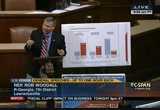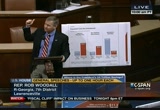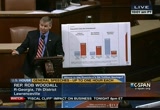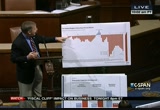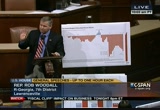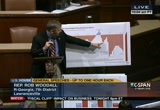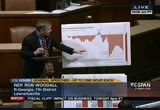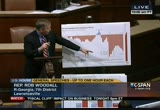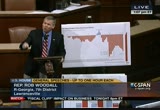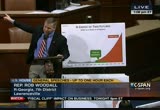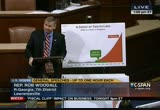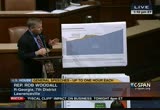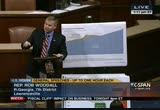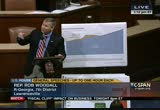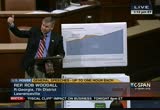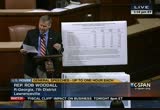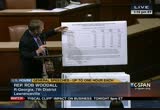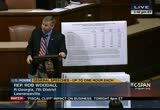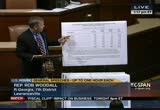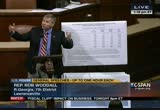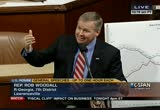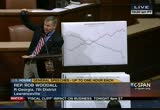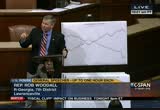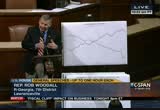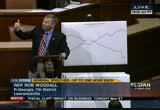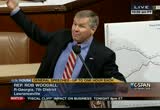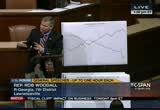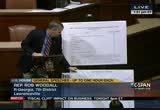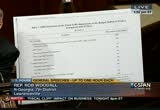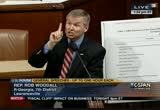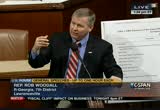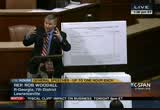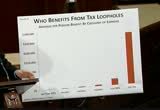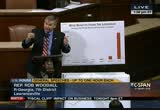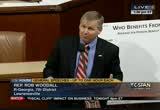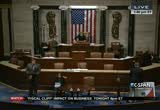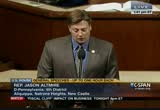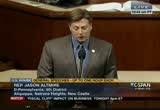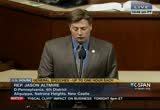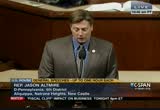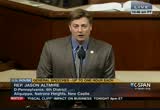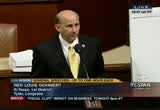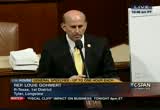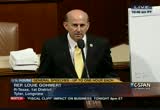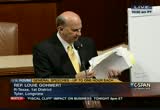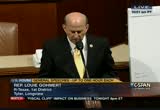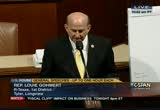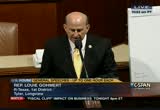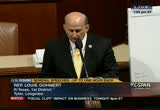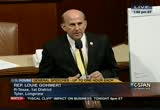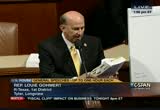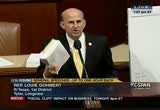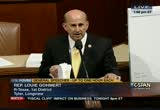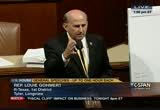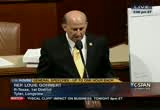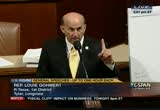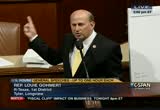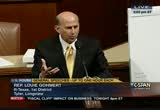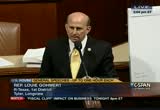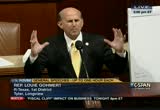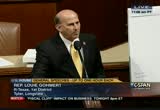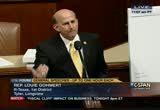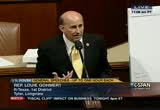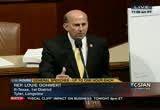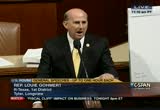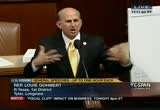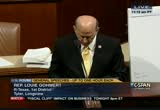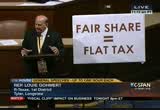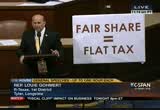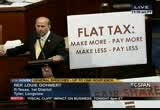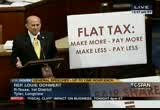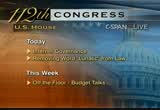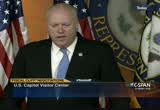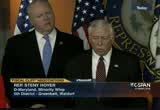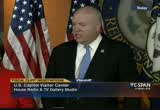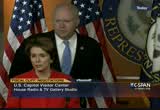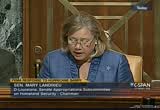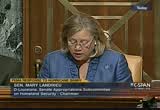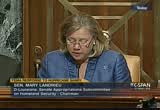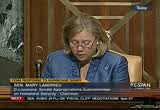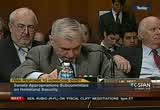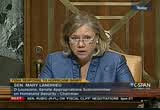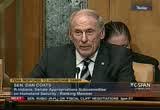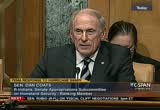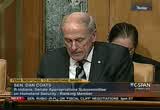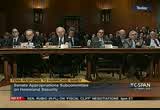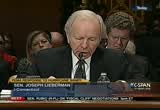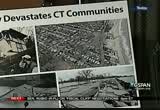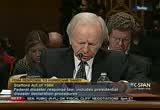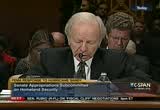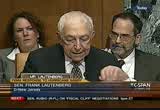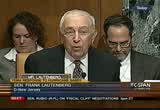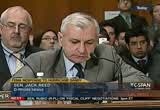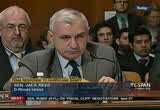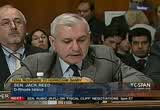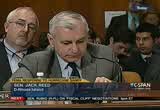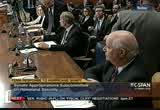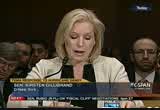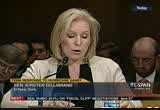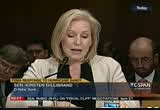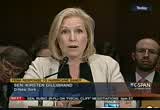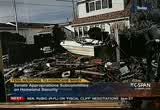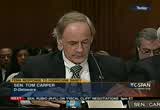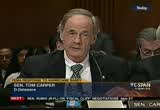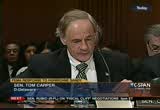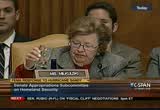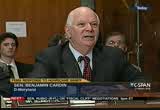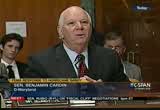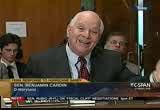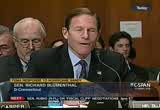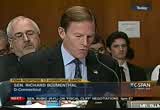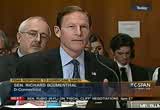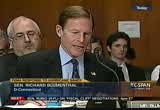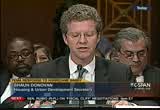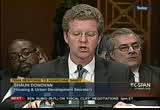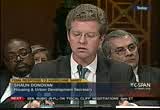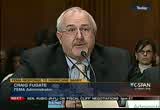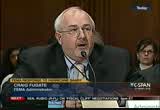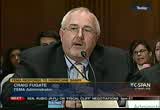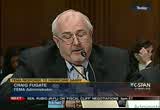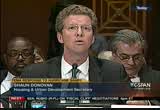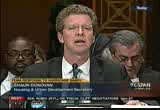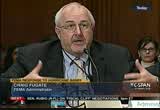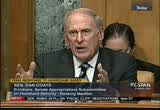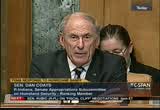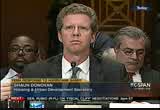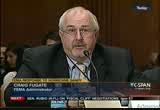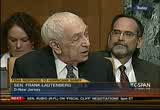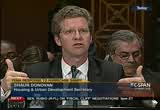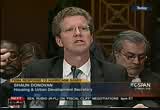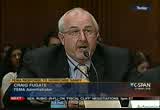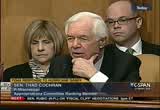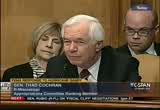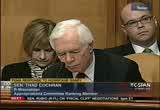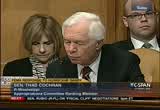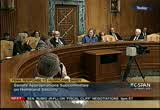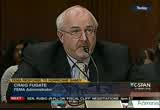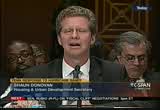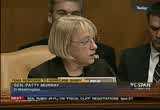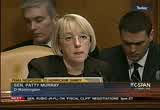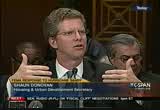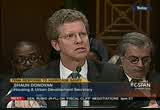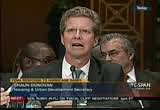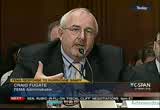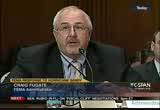tv Public Affairs CSPAN December 5, 2012 1:00pm-5:00pm EST
1:00 pm
fraud, there's some abuse and things we can fix in that program and we did that in the bill we passed in may but it's an important support program to make sure that the most vulnerable among us are cared for and they can bounce back up. it's one of those programs where we try to reach out, mr. speaker, not to prop folks up but to give them a hand up so that they can succeed. . these programs face a 35% cut. why is that? in the two years you and i have been here, mr. speaker, we have seen discretionary spending, it started in 2010 at some of the highest levels in american history. you and i in a bipartisan way brought it down in 2011. we brought it down again in 2012. and we brought it down again for f.y. 2013. i open up those newspapers, mr. speaker, folks talk about how there is no agreement here. folks are arguing and fighting with each other. in a bipartisan way this house, that senate, and our president
1:01 pm
has seen discretionary spending drop three years in a row. never before in my lifetime have we seen such a thing. i credit this body with being a driving force in that because we were elected by the american people who want to see their fiscal bucks put back in order, but we succeeded on the discretionary side. discretionary turns out to be the easier nut to crack because that money doesn't go out the door unless this u.s. house of representatives acts. that distinguishes it, mr. speaker, from mandatory spending. that's the third set of columns on my chart. mandatory spending, as i said, 2/3 of our budget, 68.3% to be precise, and of all the sequestration cuts, 63.8% of the budget is only going to bear 14.4% of the pain. the back story there, mr. speaker, is that's the only
1:02 pm
14.4% of the pain. as i said discretionary spending has been on the chopping block in 2011, 2012, and now again in 2013. but mandatory spending we haven't had a single agreement about, and i don't hear the white house talking about it, either. the white house put together a group it was called the simpson-bowles commission. it was named afterers kin bowles, a former clinton chief of staff, and alan simpson, former republican senator. and they came together and what the president called his deficit reduction commission to give the president and -- an idea what we could do to get our fiscal house in order. i want to show in you this chart, mr. speaker, it's the chronic deficits we have had in this country, goes back to 1970. all this red ink represents the inflation adjusted, 2012 dollars, comparing apples to apples across this chart, the deficit that is we have had in this country, and you see going back to 197 o 0, mr. speaker, which happens to be the year of my birth, we have run a deficit
1:03 pm
every single year from 199 . you remember 1998 we had newt gingrich leading the first republican u.s. house of representatives in modern times. bill clinton in the white house. they came together to solve some big problems. welfare reform, health insurance reform. folks forget about health insurance reform. we did away with pre-existing conditions. did away with all of the impediments in the large group markets, what they call the plans, had great success in that area, and finally got back into some positive territory. to be truthful, this assumes that all the federal -- all the social security revenues, medicare revenues are getting spent on other projects rather than going in the trust fund and being preserved. we didn't really have a surplus. we were spending social security and medicare revenues to create a surplus. but we did have some better years then. then we go into the bush years.
1:04 pm
this is important. 9/11 changed the way this country deals with national security. a lot of programs going on much to my surprise, mr. speaker, you remember, we create add brand new federal department with the republican house, republican senate, and republican president. we created a brand new entitlement program, medicare part d with a republican house and republican president. and we ran during the bush years, and represented right here, we ran at that time what was the largest deficit in american history. the largest deficit in american history were run during the bush administration with republican house, republican president. and we began to get a hold of that. that was after 2001, september 11 again, dramatic up tick in spending on homeland security, national security concerns, that's an estimation. it's not an excuse. we reached those massive deficits, the largest deficits
1:05 pm
in american history. and we begin to bring those back down. enter 2007. 2007, 2008 we had a republican president in the white house, we had a democratic speaker here in the u.s. house, spending began to tick back up. and as we entered the obama years, mr. speaker, here is the largest deficit in american history recorded during the bush administration, this is the annual deficit recorded in the obama administration. not twice as large than the largest deficit in american history. not three times as large as the largest deficit in american history. but almost four times larger than the previous largest annual deficit in american history was the first year deficit recorded in the obama administration. we tip, that was the first time
1:06 pm
ever we run trillion dollar deficits, we continue to run trillion dollar deficits throughout that time. tax policy hasn't changed during that time. tax policy is exactly the same. you hear in the newspaper all the time, mr. speaker, the bush tax cuts. i don't know that that has meaning anymore. in 2001 and 2003 we did do some dramatic changes to tax policy. president obama extended all of those changes in 2010. that's the law of the land still today. tax policy has been exactly the same over this continuum. what has changed, mr. speaker, what has changed is the spending. the reason deficits have grown not one, not two, not three but almost four times larger than the previous record deficit in american history is not because tax policy has changed, it hasn't. it's because federal spending policy has changed. and that's what we have to get our arms around here in this body. what i show going forward, mr.
1:07 pm
speaker, put a little square around the annual budget deficits that have been run during the first four years of the obama administration, but i also project what the congressional budget office believes, that's a nonpartisan budget planning group we have here on capitol hill, what they believe is in store for us in the future if we continue under current policy. -h tsh-that's trillion dollar deficits going out for years to come. the problem is not tax policy, mr. speaker, the problem is spending policy. can we improve tax policy? you better believe it. mr. speaker, you know i'm a co-sponsor, main sponsor of h.r. 25, the fair tax. that's the largest, most popularly co-sponsored fundamental tax reform proposal on either the house side or the senate side. in fact it's the largest most popularly co-sponsored tax proposal on both sides of the united states congress. fundamentally changed the way we tax. absolutely improve our tax
1:08 pm
system. but don't be misled, the problem in america is not bad tax policy, the problem is bad spending polcy. -- policy. we have to move the focus away from taxation, which again has been the same for the last 12 years, and move it towards spending which has changed dramatically just in the last four. i'm not one just to point the finger of blame, mr. speaker. this freshman class came about results. they didn't come about whose fault it was. putting blame on both sides of the aisle, plenty of blame in congress and the white house. plenty of blame going back decades. decades. but finding a solution is a priority for every man and woman in this body, all 435 men and women in this body are focused on finding a solution, and i'm just so proud, mr. speaker, i start to grin every time i start to talk about it. when you and i got here in this
1:09 pm
body, mr. speaker, we tackled fundamental spending reform for the first time in my lifetime, and we impacted just once, mr. speaker, when we came in in 2011, we passed it twice. this house has passed the only budget to pass anywhere in this town in the two years i have been in congress. we didn't do it once, we did it twice. we didn't do it one year, we did it both years. and in each, mr. speaker, we didn't just complain about those before us who left us a current path of deficit and despair going forward, which is what happens if we fail to tackle our spending concerns, we passed that path to prosperity here in the house of representatives that provided a solution. not a solution 10 years from now, not a solution five years from now, but a solution that begin to administer tough love, because that's the only kind that's left here, in year one.
1:10 pm
can't kick the can down the road. have to take these challenges on head-on. it's not just about the day. again, mr. speaker, there are solutions. we propose that solution in the ryan budget. i say ryan budget. i'm proud, he's my chairman, i sit on the budget committee. it was a very cooperative process. he laid out his ideas. had he this great committee of democrats and republicans there. we gave input and made changes. we passed that committee in the budget committee, passed that budget in the budget committee. we brought it to the house floor. we had a free-for-all where every member of the house who wanted to introduce a budget could introduce a budget. there were several. every man, woman in this body who thought they had a better way to solve america's fiscal crisis could introduce a budget. and many of them did and only one of those budgets passed this body. that's now the house budget. passed not once but twice. provided real solutions. mr. speaker, here's our spending represented a different way,
1:11 pm
because there's so many head herrings in this body. i -- red herrings in this body. i want to say, mr. speaker, if you help me spread the word with my colleagues on the left. i'm on the rules committee. we often handle the rules debate here on the floor. it gets toxic from time to time. folks are trying to make their point. everybody's got their talking points. it turns out into an -- turns into an argument instead of a discussion how o to make america better. i do hope in this coming time, whether we use special order to do it, time off the floor to do it, we'll find an opportunity to have more of a discussion. because the facts are what the facts are. we ought to be able to agree on what the facts are, and then we ought to be able to disagree what about the solutions are. we ought to be able to question each other's judgment without questioning each other's motivations. i hope we'll be able to spend some time on that. i heard folks say, mr. speaker, oh, the problem is that global war on terror. it's all those war fighting efforts. that's what put us in this
1:12 pm
deficit circumstance that we are in. mr. speaker, this blue represents base spending. going back to 2002. i started right there when the wars began. this yellow line represents the spending that was done on the global war on terror. it's a big number, mr. speaker, because our commitment to our men, women in uniform is unequivocal. unequivingal. we stand by -- equivocal. we stand behind the men and women who have been asked to go overseas to protect our nation. we defend them here in this house with our budget vote unequivocally. but it's a small number, mr. speaker, compared to all the other spending that goes on. clearly this yellow line is not what has created a trillion dollar budget deficit, the largest budget deficit in american history by a factor of four. it's the base spending that does that. here are the financial bailouts. i would have voted no on the bailouts had i been here, mr. speaker.
1:13 pm
you and i were not. it wasn't the financial bailouts. as good or bad as they were. there is no agreement on it. that is not what created these massive deficits. it's this giant blue line here. finally, the 2009 stimulus bill. 2009 stimulus bill, actually the largest portion here in recent history of what we are spending, spent more on the stimulus bill than we spent on our men and women fighting two wars overseas. even that is not responsible for this continuing growing line of federal spending. spending more than we have ever spent before. in fact, in 10 years, spreebling, -- mr. speaker, 10 years, from 2002 to -- from 2012 to 2022, again if we do nothing, federal spending is expected to rise by 33%. i don't know if you your salary
1:14 pm
is expected to rise by 33%, mr. speaker, if you are working in middle america. i know my community salary is not. 33% the size and scope of government, and the president is proposing to grow it more. to spend more. the problem is isn't tax policy, mr. speaker. the problem is spending. you know, mr. speaker, we hear a lot about fairness. i want to talk a little bit about that now. i'm going to switch to tax policy because that's what everybody seems to be obsessed with in the media. i want to make sure we dispel some of the myths of what's going on there. i went to dictionary.com as i'm apt to do, mr. speaker, and printed out what fair is. they said free from bias, dishonesty, or injustice. the first definition. free from bias, dishonesty, or
1:15 pm
injustice. and two, legitimately thought, pursued, done, or given proper under the rules. fair. but i think we all support fairness. i'm certain that we do, but i'm absolute certain what president obama believes is fair is different from what the people i represent believe is fair. and what i brought here, mr. speaker, is a chart from the joint committee on taxation, that's the group here on capitol hill that is in charge of measuring all the tax policy, it's a nonpartisan group, they just try to tell you what the facts are about tax polcy, and this chart represents what the facts are in 2010, about the taxes and tax rate. that was the most recent year for which they had a study. . it was the tax returns turned in in america. there was 155 million of them, 155 million tax returns turned in america. adjusted gross income, that's not actually your total income.
1:16 pm
it's a machination. you go through there on your tax returns. we put it in different categories. out of 155 tax returns turned in, mr. speaker, 155 million, just under six million reported income of $200,000 or above. 155 million just under six million reported an income of $200,000 or above. what's even more interesting, though, is the number of returns below $10,000. because we're going to talk about fairness. those folks under $10,000, i don't think there's a man, woman in this body who believe there's a family of four trying to live on $10,000 that doesn't want help. i pinch pennies as much as
1:17 pm
anyone. i have sales for wal green's and cvs. that's tough to do in today's economy. $10,000. so that's why it's so interesting. look out here. of the -- almost 21 million tax returns filed, only 14 of them ended up having a tax associated with them, 425,000 were itemized. now i want you to think about that, mr. speaker. you know, most americans don't itemize on their taxes. they have the standard exemption, the standard deduction. most americans take that. even homeowners. of course, the mortgage interest deduction is the largest itemized deduction that most american families take followed by the charitable deduction. but most american families don't itemize at all. so you have to ask yourself, mr. speaker. who are the folks who are
1:18 pm
reporting under $10,000 a year in income who are doing all this itemizing? it's about 30-1. even down here among the richest of americans, mr. speaker, it's 1-1. 30-1. folks are gaming this tax code, gaming this tax code to participate not at all in the funding of our government. and when we get together here to try to think about how we take care of the poorest among us, when we get together here how to reach out to those less fortunate among us, we lock at this category. sure -- look at this category. sure, folks who make $10,000, they're doing such clever crazy things on their tax code that the standard deduction and standard exemption are not good enough for them and they are going to maximize their return even more so they can get to zero, those folks are not the ones who need our help.
1:19 pm
we need to consider that in the context of fairness. 155 million returns, six million of them over $200,000 a year. you know, we're in a republic, mr. speaker. some folks say democracy. obviously it's republic, but the majority can rule here. and i'm just doing the math in my head. if there are 155 million people filing tax returns but only six million of them are making more than $200,000 a year, i'm pretty sure that i can find 51% that say let's not tax us but let's tax them instead. i want you to think about that in the context of fairness. just in the spirit of full disclosure, mr. speaker, i'm not in the 1%. i have aspirations one day to make it in the 1% but i am not in the 1%. never have been in my adult
1:20 pm
working life. i don't think i'm going to make it anytime soon. i aspire fiscal success. i hope i have those good ideas that people will pay for. i hope by the sweat of my brow and the power of my work ethic i can generate some wealth. but i'm not part of the them that folks want to tax. i'm part of the us that folks don't want to tax and are going to get a free ride in this proposal from the president. i want to talk about that in the context of fairness. let me tell you something you may not know, mr. speaker. jimmy carter was the last president from the great state of georgia so i'm going to start in the last of the carter years, 1979. what i have here on this chart is the percentage of all federal income tax liability paid by citizens of the united states of america. what are we doing as citizens of america to pay for our government? and in the last year of the carter administration, the bottom 80% of american income earners, which is most of us, that's the middle class.
1:21 pm
that's everybody there. the bottom 80% was paying 35% of all the bills in this country. 80% of americans were paying 35% of the bills. that top 1%, mr. speaker, that top 1% of america was paying 18% of the bills. now, again, we talk about fairness. i -- again, i'm not in the 1%. though i might like to be one day. for the 1% to be paying 18% of all the burdens of this country , is that fair? is that fair? for the 1% to pay 18%, is that fair? again, we can look at the numbers, we can look at income distribution, we can look at all sorts of things. think about that in the context of we always talk about people paying their fair share. in the last year of the carter
1:22 pm
administration, the top 1% were paying 18% of the burden of america. but this is what's really interesting. and to me, mr. speaker, troubling. as a first-term member in this united states house of representatives, look from 1979 out to today. and what you see beginning in the 1990's is that the majority of us, the 80% begin to pay less of our federal burden than do the 1%. in fact -- and it's staggering to me, mr. speaker, until i went and pulled the numbers. as we sit here for, again, the last number of year for which c.b.o. is able to produce numbers, it's 2009, in 2009, the 80% of us who were in the middle, the 80% of us who form
1:23 pm
all our communities back home and all of our clubs, the 80% of us who show up to church on sunday and polls on tuesday to make sure that we're doing our civic and spiritual duty, 80% of us were only shouldering 6% of the total income tax burden in this land. now i just want to ask you, mr. speaker. we're all smart folks. i drive something to get something free with rebates, walgreen's. i really don't like the new policy they have with coupons that expire. i want to get back to the gift card program. that's not something we're going to do here on the floor. i can mandate that for them. 80% of us are paying 6% of the burden. what do you think that does to elections? you see it in the children in your life. when they have some skin in the game, when they have some
1:24 pm
chores they might not have to do if they negotiate properly, if you have skin in the game you make different decisions. you find when you give the children in your life some money in your pocket and they are making impulse buys, if they have a dollar in their pocket, they're looking hard at the products. seeing what's two for one. they are going to look at what they're going to purchase in the candy aisle in the grocery store. but when they don't have any money in their pocket and they're just asking mom and dad to pick up the tab, there's no limit to what it is they're interested in having. the sticker looks good. how about some sour things, my breath is bad, i need some gum. across the board, no limit in what it is they want. what's going to happen to our republic, mr. speaker, if we, the 80%, allow ourselves to
1:25 pm
only be burdened with 6% of the job of paying for the obligations of this country? completely inverted there, mr. speaker. today, again, 2009, the last year for which we have numbers, the top 1% paid 39% of all the bills. but, again, if the 80% are only paying 6% of all the bills, that means the top 20% are paying 94% of all the bills. again, what election is it that we're going to have where folks say, you know what, that guy over there shouldn't be picking up the tab for me? what's happening to us as a republic? who are we now as the people?
1:26 pm
do we want to help the least among us? absolutely we do. we always have. we always will. we can argue about whether we should do it from the federal government or from the state government or from our communities and our chumps but of course we're committed to fulfilling those goals. but we cannot, it is not fair and i argue it is immoral to face the kind of challenges that we're facing and say, you know what, we, the 80% of america, aren't going to help at all. we're already paying 6% of all the bills. there are 80% of us. we're the primary beneficiary. we're paying 6% of all the bills. we don't want to pay more. tax them. that is incredibly dangerous. and anti-theycal to who we are as a republic -- antithetical to who we are as a republic.
1:27 pm
ben franklin is often cited, if people find they can vote themselves money that will herald the end of the republic. that makes sense. it takes 51% to win an election. if 51% of the people can make sure that 49% have to bear all the burdens and pay all the bills and do all the fighting, then the thore 51% can take the day off. then franklin worried about that over 200 years ago. milton friedman, passed away, by his words are still with us, i think said it well. in his free to choose statement, mr. speaker, back in 1990, he said this -- there is all the difference in the world between two kinds of assistance through government that seems superficially similar at first. one, when 90% of us agree to
1:28 pm
impose taxes on ourselves in order to help the bottom 10%. when 90% of us agree to impose taxes on ourselves so that we can help the bottom 10%. and second, milton friedman said, when 80% vote to impose taxes on the top 10% to help the bottom 10%. all the difference in the world, milton friedman said, between 90% of us choose to burden ourselves so that we can help others and when 80% decide they want to burden a different 10% so that they can help yet another 10%. it is different. it's morally different. and i got to tell you, mr. speaker, and that's what i love about our freshman class, republicans and democrats
1:29 pm
alike. nobody came here to pass the buck. nobody came here to say decisions are easy and somebody should have made them earlier. they came here saying decisions are really hard but we're going to make them anyway. that's the morality of deciding that our country is in peril and the people who ought to solve it are them, not us, but them. not me but someone else. not my family but someone else's family. there's a morality there. i'm the first to tell you we need more revenue in this country. the reason we don't have much revenue is because if you don't have a job. if you don't have a job you don't have income and if you don't have income you can't pay income taxes. that's not rocket science. got to get folks back to work and more, mr. speaker. if you're a family of four and you're earning $30,000 a year, you can't afford to pay the bills of this country in the same way that someone making
1:30 pm
$200,000 a year can. that's ok. we understand that. that's why there are graduated rates in the income tax code. some people 10%. some people pay 15%. some people pay 25%. some people pay in the 30's. the more you have the more we think you're able to contribute, but here we are in what every american economist would agree is one of the most dire economic circumstances of our time and what i hear described as leadership from the president is don't change anything for the 80%. in fact, spend more on the 80% and go tap that last 1% to pay all the bills. the top 1% are already paying all the bills. . this chart i would say demonstrates a moral imperative
1:31 pm
that we have the and grapple with as american citizens, as members of the greatest self-ruling nation the history of the world, what we have already seen is just in my lifetime, born in 1970, just in my lifetime, through self-governance, we have completely turned on its head who pays the bills for america. and more and more and more and more we have said it doesn't need to be me, it doesn't need to be us, it can be them. they can do it all. that is not who we are. that's not who we teach our children to be. and it's not the legacy that we want to leave behind. 80% of us, 80% of us, including me in this country, are paying only 6% of the burden of being an american citizen.
1:32 pm
this chart, mr. speaker, reflects what happens if we go off this fiscal cliff. it's a spending decision and a tax decision, but i list them both up here. this chart comes from the congressional research service. a couple interesting things i want to point out here. first and foremost, if we do nothing, tax increases of about $400 billion, there are going to be spending reductions of about $102 billion, there are some other changes that happen at the end of the year that aren't associated with policy decisions, at the end of the day we change the scope of our deficit by about $607 billion. if we do nothing, that's what makes this such a hard issue to grapple with, mr. speaker, if we do nothing, if we reach no agreement, changes that happen automatically and burden us all in different ways, will create
1:33 pm
$607 billion for the u.s. treasury that we didn't have before. and that's only half of the annual deficit. you see all the pan damone yum that -- pandemonium folks are describing, all the frightful words used to describe the fiscal cliff, if we roll over that fiscal cliff and all of those bad things come to bear, the tax increases and the spending reductions, collectively they make $607 billion. and if we apply that to next year's deficit, we still won't reduce next year's annual deficit to the level of what used to be the highest deficit in american history run up under the bush administration. we can roll right over the fiscal cliff, create $607 billion in savings we didn't have before, and we still won't
1:34 pm
have reduced our annual budget deficit to what was formerly the highest budget deficit in american history before the obama administration. that's how far out of whack we are. i'm not trying to blame the president for that. i think there is some blame here, there is blame everywhere. i only say the obama administration so folks understand this is a problem that has existed as long as i have been alive, we have been running systemic deficits. but in the bush administration we were running the highest deficit in american history and today they are four times larger. and if we roll over the fiscal cliff and everyone says it's going to be so awful, we only solve half the problem. still don't get back to what used to be the most profligate spending days in american history, used to be the largest american deficits in american history, the bush administration. that's number one i want to get from this chart. here's number two, mr. speaker.
1:35 pm
going back to the grappling with fairness, who we are as a people, what we are about. put up that chart earlier that showed how some folks are getting away with paying zero even though had he this lots of money. they were itemizing it along the way. their right as an american citizen to take advantage of those federal tax laws. we tried that back in the late 1960's, early 1970's. we created what was called the alternative minimum tax, it was designed, you can reid about it in the congressional record, it's right there, it was designed to get them, we talked a lot about the us, the them. the them are the people with the money who aren't paying their fair share. argue about what fair share is, that's why we created the alternative minimum tax. the them weren't making the proper payments. what it turned out to be was they really were making a lot of money, they really were itemizing a lot of deductions, they were wealthy folks doing all the things the tax code encouraged them to do, but they ended up paying zero and the 0%
1:36 pm
of us didn't like it. they shouldn't be paying, they should do better. here's the thing the alternative minimum tax is still on the books today. we did such a crummy job trying to attack the rich back when we created the alternative minimum tax, it's grown out of control. it hits middle income americans all across the country except that the congress fixes it one year at a time. that's one of the crazy things you learn when you become a congressman is you don't actually solve problems long term. you apparently just fix them one year at a time so you can come back next year and fix the same problem the same way once again. all the taxes in the bush administration, all these taxes we talk about, the ones the president bush passed in 2001 and 2003, the ones that president obama extended in 2010, all of those taxes combined create $104 billion for next year. that's $104 billion change. fixing the a.m.t., fixing the
1:37 pm
alternative minimum tax, solving this things that we created in order to tax the rich, to keep it from impacting the middle class, is going to cost 117. all the bush tax cuts combined are 104, fixing this problem that congress created back in the early 1970's, 117. we don't do that well when we are trying to attack the bill in order to avoid the burden on the us and we are going to see that when we do the a.m.t. patch again this year. i want to close with this, mr. speaker. i have a chart here who benefits from tax loopholes. i'm a fair tax guy. h.r. 25, mr. speaker, i hope you'll pull it out, think about being a co-sponsor if you are not already, i want to change the way we do taxes in this country, but just by closing loopholes, i hear the newspaper ask all the time, which
1:38 pm
loopholes, what loopholes, how are you going to do that? this shows who benefits from the loopholes, mr. speaker, in the tax code. it's not the bottom 20%. it's not the second 20% or the third or the fourth. it's not really even the top 20%. it's the top 1%. i would just encourage you, mr. speaker, to ask the president as we are going through these discussions, he clearly has campaigned on getting more money out of the 1%. i showed this chart, mr. speaker, the question is the morality of where we end up. the question is what it means to our republic at the end of the day. if we continue to give so much of the burden to the few and leave the rest of us with none of the burden at all. but if he is intent on doing that, he doesn't have to raise tax rates. he can do it through abolishing tax loopholes. which makes the code fairer and
1:39 pm
more transparent to us all. we have a right to know what we have to pay in a tax code. these loopholes obscure it. mr. speaker, i don't know what's going to happen in these final days. i know that the speaker of this house is committed to doing the things that matter, to making a big difference for our children and for our grandchildren. to not kick the can down the road one more time. i pledge to support that plan, mr. speaker. i, too, did not come here to kick the can down the road. i came here to make the tough decisions, and i a -- say to my friends and there are a lot out there who made tough decisions and they paid a price for it. that's not a short list of folks. that's a long list of folks. and it happens every two years. you see people who had the courage to do what they thought was right and they pay a price for that in terms of their political career.
1:40 pm
but what i love about this institution, mr. speaker, these freshmen that i was elected with, you and i were elected with, these new freshmen coming in after the past election, i see men and women who care so much less about a political career and care so much more about doing things that matter for this republic. i'm proud to be associated with. i'm convinced if we get past the rhetoric and get back to the discussion, we are going to be able to come up with a solution that the american people will be proud of and that we can be proud to tell our children and grandchildren that we were a part of. with that, mr. speaker, i yield back the balance of my time. the speaker pro tempore: the gentleman's time has expired. for what purpose does the gentleman from pennsylvania rise? >> move to address the house. the speaker pro tempore: under the speaker's announced policy of january 5, 2011, the gentleman from pennsylvania, mr. altmire, is recognized for 60 minutes as the designee of the minority leader. mr. altmire: thank you, madam speaker. i appreciate it. i will not speak for nearly 60
1:41 pm
minutes. i'm tempted to engage the gentleman, my good friend, mr. woodall, in debate, but i won't do that because i know he's still smarting from his bulldog's loss over the weekend and i'm going to let him continue to think about that. i very much enjoy the friendship and camaraderie with mr. woodall, we do have a difference of opinion on some of those issues. before i start, madam speaker, i would say to the group, the individual who will be speaking following my presentation, that i plan to only speak for about five minutes. or less. so this will not be an hour-long presentation. so the speaker who will follow me on the majority side i would recommend they hang near the floor because i will be wrapping up shortly. madam speaker, i rise to commemorate the 50th anniversary of laroche college. founded in 1963 by the sisters of divine providence in
1:42 pm
mccandliss, pennsylvania, a suburb of pittsburgh, it was named in honor of ma reap laroche, the first superior of the congregation of the sister of divine providence. originally, laroche was a college for religious sisters but it now educates a diverse group of students from around the world offering high quality educational opportunities that continue to reflect its catholic heritage. soon after its founding, laroche experienced financial difficulties that threatened the school's existence. due to the financial strain, the congregation at that time seriously considered permanently closing the college, however, because of the profound and positive impact this school has made on the community in such a short time, its donors at that time, the students, the state official, the community leaders urged the congregation and the school's leadership to continue the mission of the school and
1:43 pm
keep the school opened. thankfully due to the outpouring of support from the community, in 1970 the board amended its charter to establish laroche college as an independent co-educational catholic institution which it remains today. it also joined with the art institute of pittsburgh and diversified its course official, expanding the areas of study the college would offer, including graphic and interior design programs that are among laroche college's most popular programs today. i was proud to serve on the board of trustees at laroche college, and it was during my time as a trustee that i had the wonderful opportunity to get to know the late monsignor william kerr who served as laroche's president for 12 years. it was during his tenure that the college established the scholarship program for outstanding college-age men and women from conflict and post
1:44 pm
conflict nations such as rwanda and boss kneea. the i.n.s. -- bosnia. the institute allows students to receive an education at laroche college to study leadership and diplomacy in return for their agreement to return to their host country, home country, after graduation to help engage in the peace process and rebuild their nations. the institute successfully reflects the college's vision and mission to foster global citizenship. and that program over the years has created a bond with some of these countries, it is unlike any other institution of higher learning, in america. it has had students go through the program that have gone back to their home countries, that have very successfully become leaders in those countries and we are better off as a nation and as a global community because of their work and because of that program which initiated and continues at laroche college. it was also during my time on
1:45 pm
the board of trustees in 2004 that laroche college board of trustees appointed sister decasio as the college's seventh president. she began her career in education at laroche in the late 1980's and it's under her leadership that the college has continued to expand its global footprint while placing a renewed focus on serving the needs of those in the pittsburgh region. . i spent time with sister candice. the future is bright for the college under her continued leadership. la roche college improves upon itself year after year. it continues to expand its academic offerings with more than 50 undergraduate majors, 20 undergraduate minors and three graduate programs. for six consecutive years it
1:46 pm
has been named one of the best northern colleges by pinston review and has four intercollegiate athletic programs. on many occasions my office used their facilities for work shopts and town hall meetings. and over the years la roche college students and faculties, swfs sister candace's leadership team, came to visit my office on a number of occasions to discuss the importance of education to our country and their efforts to collaborate with the greater pittsburgh and western pennsylvania community for the betterment of our entire region. the leadership of the college per severed. they kept the doors opened and always stayed true to the mission of the school. la roache college is a tremendous asset -- la roche college is a tremendous asset to our community. i british them nothing but the
1:47 pm
best and a congratulations on their 50th anniversary at la roche college. and with that, madam speaker, i yield back the remainder of my time. -- remainder of my time. the speaker pro tempore: for what purpose does the gentleman from texas rise? under the speaker's announced policy of january 5, 2011, the chair recognizes the gentleman from texas, mr. gohmert, for 30 minutes. mr. gohmert: thank you, madam speaker. it's a pleasure to follow my friend from pennsylvania, mr. altmire, before that, my friend from georgia, mr. woodall. the last vote we took today was
1:48 pm
to eliminate the word lunatic from our federal law, and i don't have a problem with lunatic being used in the federal law. and apparently i was the only one here on the floor that didn't have a problem with using the floor lunatic. in fact, it occurred to me that not only should we not use the term lunatic -- and i've eliminated the word lunatic at a time when we are facing national bankruptcy if we don't get serious about our issues, we should also use the term to identify those who want to continue doing business as usual around this town. it's time we got serious. one of the things that would
1:49 pm
help the administration get serious, because it is a big deal and not because c.b.o. has no clue what it's going to cost as illustrated by $1.1 trillion, $1.6 trillion, and maybe $1.8 trillion. they don't have a clue. they are not allowed to use historic reality, real rules to score. they use fictitious static rule that is just so inaccurate. it would be a joke if it weren't so sad as to what it's done to good legislation. because of the emphasis on tax and all the people that are going to be hit with a tax because this administration and
1:50 pm
the democratic senators down the hall, at least their leadership, continue to play games of cat and mouse, chicken with the future of our financial stability, economy. it's important to look at taxes . the president says, for example, majority leader reid in the senate say they want to help the middle class, the poor working folks. so apparently -- and i know former speaker pelosi said we need to pass the bill so we can find out what's in it, but it's obvious from leader reid's comment and the president's comments those two people never read obamacare bill. and it's a bit of interesting reading. i did go through it all before i voted against it. a lot of interesting stuff. i don't know why the army --
1:51 pm
why the president needs his own commission and noncommissioned officer corps. there were tossouts to big pharmaceuticals, aarp. you know, things -- if you saw somebody endorse this bill, then you could find a provision in here, if you knew where to look for, where they got their pound of pork. so it's quite interesting. i would, mr. speaker, i would encourage the president and harry reid since they have slapped this bill on the backs of every american, they really ought to read what they've done to americans. there are a lot of people that have. there's a good article. seemed to be -- i don't know guy benson but political edor for townhall.com wrote in
1:52 pm
september, 2012, talking about president barack obama's re-election. has been running millions of dollars worth of advertisements claiming that mitt romney's plans will raise taxes on middle class americans. this isn't true. romney promises precisely the opposite. in factcheck.org has called out democrats for repeated -- repeatedly debunked the charge. to paraphrase president clinton's d.n.c., it takes a lot of brass for criticizing someone for doing something you've done yourself. so before we get into the last punch line, let's go back to videotape. online it had a video that could be punched. it was president barack obama speaking. part of his quote says, i can make a firm pledge under my plan no family making less than $250,000 will see any form of
1:53 pm
tax increase. not your income tax, not your payroll tax, not your capital gains tax. not any of your taxes. the article goes on. this man's firm pledges aren't worth too much, are they? it's worth -- if only to marvel at the sheer hypocrisy. congressional budget office determined that millions of americans will bet socked by the obamacare mandate. 80% of whom are middle income citizens. nearly six million americans, significantly more than first estimated, will face a tax penalty. under president barack obama's health overhaul for not getting insurance. congressional analysts said wednesday. most would be in the middle class. the new estimate amounts to an inconvenient fact for the administration, a reminder of what critics see as broken promises.
1:54 pm
and the budget office analyst -- analysis found that nearly 80% of those who will face a penalty will be making up to or less than five times the federal prompt level. currently that will work out to $55,50 or less for an -- 55,050 or less for an vidge or average penalty about $1,200 in 2016. and it goes on to point out c.b.o. has also said there will be 30 million people without insurance, all but the six million will be exempt from the tax. exempt americans are a combination of illegal immigrants and those with incomes too low to pay income tax. so just so we're clear, the article says, obamacare raids
1:55 pm
$716 billion from an almost insolvent medicare to chip in toward its own $2 trillion price tag, raises premiums on average families, increases national health care spending faster than doing nothing would have, swells the deficit, exacerbates the national doctor shortage, is insanely costly and difficult to comply with and raises taxes by $500 billion on the backs of millions of middle-class families. and the country will still have 30 million people lacking health insurance. what a deal. and most of that dysfunction doesn't kick in until 2014. if it kicked in in 2012, you would have seen a different president elected, i'm sure. in any event, what the
1:56 pm
obamacare bill requires, and one further comment, when a bill is based on a fraud, it's probably not going to end up being a good bill. the obamacare bill -- and i hear people talk about 2,700 pages, 2,500, 2,600. let's see. my version here -- this is one we got from the official printer -- 2,407 pages. but it's interesting, the title of the bill, resolved, that the bill from the house of representatives, h.r. 3590, entitled, quote, an act to amend the internal revenue code of 1986 to modify the first-time homebuyers credit in
1:57 pm
the case of members of the armed forces and certain other federal employees and for other purposes do pass with the following amendments. strike out all after the enacting clause and insert obamacare. so they took house bill 3590 that was an act to amend the internal revenue code of 1986 to modify the first-time homebuyers credit in the case of members of the armed forces and certain other federal employees and for other purposes is a tax credit for our military members. and they struck as it says, strike out all after the enacting clause and insert obamacare. that's a fraudulent bill. that bill did not originate in the house. it originated in the senate, and the constitution requires that anything, any bill that raises revenue must originate in the house.
1:58 pm
it started as a fraud. this bill became a fraud when it was enacted and it was asserted that this originated in the house. it did not. we had a first-time tax credit for first-time homebuyers for our military. there was nothing germane about obamacare to a tax credit for our military. that's why i say a bill that starts out as a fraud is probably not going to be real good for a lot of folks. so though the president promised people all across america over and over that if you make less than $250,000, then you will not see your taxes go up. well, let's take a breather from the so-called fiscal cliff -- truth of the matter is we went off of that back in august of 2011 when we passed that
1:59 pm
ridiculous debt ceiling bill that is going to gut -- further gut medicare on top of what obamacare did to it and also gut our national security. but looking back at obamacare and the tax consequences -- madam speaker, that's why i keep saying the president really ought to read the bill that bears his name that people refer to as obamacare. he really ought to read it. majority leader reid really ought to read the bill, because he'll get to the part that has a mandatory provision that the supreme court had to take up is this mandate a penalty or a tax and, of course, the intellectual jim nastic that our chief justice had to go through to say between pages of 11 and 15 of the opinion that
2:00 pm
this is a penalty, it's not a tax, because under the statute, the supreme court, no federal court would have jurisdiction to take up the case if it's a tax because you'd have to wait until 2014 because under the junction statute under federal law the court, no court, no federal court could take it up until the tax is actually imposed and the person filing suit is actually someone against whom that tax is imposed. they'd have to wait until 2014, so in the intellectual gymnastics of the chief justice , he congress called it a pnt. it's really a penalty. they knew what it was. it's a penalty. it's not a tax for these purposes because it's just being assessed against someone if they don't buy this basic health insurance policy. and it's estimated that will
2:01 pm
cost thousands and thousands of dollars. then of course you get on over to around page 60 and after he said it's a penalty, therefore the anti-injunction statute doesn't prevent us from taking jurisdiction, now we have jurisdiction, we'll take it up. now we take it up. say it's really a tax so it's ok. boy, that kind of intellectual lack of integrity in any federal entity is a danger to the ongoing of the nation. but for those of us that did read the bill, you find that if someone is making 1 3% of the poverty level or more, they must buy-133% of the poverty level or more, they must buy the basic obamacare policy. well, 133% of the poverty level
2:02 pm
would be for one person, would be $14,856. so anyone in america who makes more than $14,856 as an individual, and in case those at the white house don't know, $14,856 is less than and not even equal to $250,000, but you make $14,856 as an individual, when the tax kicks in, you will pay an extra 2.5% income tax as a penalty for not buying the obamacare health insurance bill, and so you will get popped with an extra 2.5% tax, which will be $371. slapped on the people that can afford it the least, this obamacare bill slaps $371 extra
2:03 pm
dollars on somebody that can't afford health insurance at a time they can't afford to pay the extra tax. congrat -- that's why i really wish senate majority leader and the president themselves would read this bill so they know what they are doing to people so that when they say this isn't going to hit anybody with any extra tax if you make less than $250,000, if they continue to say it, they'll know that's simply not true. if you are a couple and you make $20,123, and you cannot afford between the two of you, you just scraping by with $20,000, gas prices up because of all the money flooded in to the market
2:04 pm
created by the federal reserve, inflation's going to be kicking in bigtime this next year, and it's going to be a struggle for any couple that's making $20,000. it's going to be tough. prices of everything will be going up. and -- as a time when they will not be able, probably, to afford several thousand dollars for the obamacare basic policy, some estimates have been it will be around $12,000, then you're going to pay an extra $503 in a tax penalty because of obamacare mandates it. let's go to a family of six, if you're a family of six and you make $41,190, and you cannot afford thousands and thousands of dollars for the basic obamacare health insurance
2:05 pm
policy, then this poor family struggling with -- i grew up in a family of four kids, times were good we ate beef, when times were not we'd have beanie weenies, i happen to like them just fine, but it's still a struggle. for those who continue to struggle, as i heard jay leno once say, four words, craft macaroni and cheese. one of my favorite meals. nonetheless, it's going to be hard to afford even macaroni and cheese if you have a family of six, you are making $41,190, and you can't afford thousands and thousands of dollars for the obamacare basic policy, then, hello, you are going to pay over $1,000 additionally in your income tax.
2:06 pm
i hope and pray that somebody in the majority -- i know the hearts of so many of my friends across the aisle, they care deeply about people suffering in america. i know they do. they really do care. that's why i want them to read obamacare. as i did. and see what you are doing to the poor and the downtrodden in america. the president still went around saying, if you are making this, you are not going to have any extra tax. wrong. read your own bill. speaker pelosi said, we'll find out -- we'll pass the bill and find out what's in it. they still don't know what's in it. that's why somebody's got to stand up and tell them. what's in this bill is taxes on people that cannot afford it. if they cannot afford thousands of dollars for a health insurance policy, they are not going to be able to afford
2:07 pm
$1,030 in extra income tax that our president and all the democrats passed without a single republican vote, they are not going to be able to afford that. i guess that's why obamacare is going to provide for an additional 17,000 or so i.r.s. agents. because these poor family of six , making 133% of the poverty level, you are probably going to have to chase those two adults down in that family of six and get blood from a turnip because they don't have the $1,030 to pay in extra income tax. if they did, they might try to buy some form of health insurance. even if they spent $1,030 on the health insurance policy, that still would not, from the estimates we have seen, that would not be anywhere near enough to buy the basic policy
2:08 pm
required by obamacare. this is going to devastate the working poor in america. again, i go back, any bill that starts as a fraud is probably not going to be good for america. so we come back to all of the rhetoric about taxes. look, people have already forgotten, too many people in the house and senate, have forgotten in july of 2011, that's the real time we were facing a fiscal cliff. look, if you don't cut at least $4 trillion over 10 years, which is $400 billion a year, we are running a deficit at that time around $1.5 trillion over what we were bringing in.
2:09 pm
they are saying, i thought it was pretty modest, if you don't cut at least $400 billion of the $1.5 trillion you are overspending, then you are going to get downgraded. leaders in both parties really didn't take that seriously. so they came back with a proposal of a super committee and if the super committee didn't reach an agreement on $1.2 trillion over 10 years, $120 billion, a reduction from the overspending of $1.5 trillion, that should have been a drop in the bucket. that's nothing. we should have been able to cut that much. we didn't do. so now the sequestrations are looming and we come back to this issue again. i'm shocked so many people have already forgotten.
2:10 pm
when we failed to cut $4 trillion over 10 years from our budget back in the summer of 2011, we got downgraded. and things got more expensive. geithner back then was saying august 2, the world comes to an end financially. we are going to hit the financial ceiling. it's going to be disastrous. and then basically, i guess interpretation, we get just kidding. we are going to be ok for a little longer, but we are about to hit it anyway. well, the financial cliff was approached and we went over it. and now we are bouncing down the cliff from ledge to ledge. and i'm hopeful at some point we'll say we have fallen far enough. let's don't go all the way down
2:11 pm
to the bottom of the abyss. let's start climbing out of this vast hole we dug for ourselves. that we have been plummeting down. let's get back up on top. you are never going to do that spending a trillion more. bringing in $2.4 trillion, $2.5 trillion in spending over $3.5 trillion. and we want to eliminate the word lunatic from the federal code? that's lunacy. to think you can keep spending over $1 trillion more than you bring in, when you are bringing in about $2.5 trillion, and not pay the price. it is immoral for one generation to be spending money that the next generations haven't even had an opportunity to earn. it is narcissistic to say we are so important in our generation that we are going to lavish money on ourselves,
2:12 pm
uncontrollably, so that future generations will pay for our self indulgence. the history of america is one generation after another making sure that the generations that follow would have it better than they did. and we have come to this generation, my generation, and it's embarrassing. but we have been so self-indull gent,ers -- self-indullingent, so self-absorbed, their kids, some not even born, and they are going to have to bear the cost of what we are doing. one of our republican friends said about an hour ago, be quite sure. any deficit spending now will be a tax on someone at some point. it's just the way it is.
2:13 pm
so, we keep hearing, everybody needs to pay their fair share. and i hope that beginning now when people hear fair share, they'll think abouter a flat tax. steve forbes has been talking about it for years. rand paul had an article out a year or so ago, flat tax. my friend, mike burgess, has a proposal. many of us have proposals. mine is, look, you talk about want warren buffett to pay what his secretary does, yet you haven't made one proposal that will bring warren buffett to pay what his secretary does. that's crazy. that's why we shouldn't eliminate the word lunatic. it really has application around this town. so if you want to have -- and
2:14 pm
warren buffett ought to take heed, you run around telling people, yeah, rich people should pay more taxes, well, he's not. he's not going to pay more. not on any of the proposals that the president has run around endorsing. well, how about a flat tax that says 15% capital gains tax, what warren buffett pay, 15% for his secretary, 15% gift tax. let's just go 15% across the board. 15% corporate tax. and the irony is that the economy would so explode, so many more people would be employed, so many more people would be making more money that the revenue would actually come in in greater amounts. so we would actually get greater revenue and it would be less pain, less suffering in america. and i don't forget a couple years or so ago, 80-year-old lady in east texas said, i grew
2:15 pm
up here in east texas. in a home that had no electricity, no power, we had a wood burning stove, and now electricity, propane, everything is so expensive my social security doesn't cover it. it looks like i'm going to have to go back to a wood burning stove. just to exist. . this could be a cold winter. doesn't have to be like that. it ought to be an economic renaissance. and the more fair we are here in washington, you make more, you pay more. you make less you pay less. and i'm one of those that likes two deductions. one for charitable giving and the other for the mortgage interest dedux.
2:16 pm
we can negotiate over numbers. that's not a problem. we can compromise, we can reach an agreement, a compromise over numbers. but let's don't compromise on principle that is so basic, simply says, if you make more you pay more. it's an easy concept. you make more you pay more. you make less you pay less. that's fair. and for heaven's sake, let's do this and let's take that obamacare burden off the working poor in america that are going to get socked with that tax. and we were told for so long, if we don't do something, there will be 30 million, maybe 20 million, 30 million people in america who won't have insurance. and then we get to the bottom of it, we find out, well, now we're going to have lots of people pay lots more taxes and we're still -- oh, and we're gutting medicare in obamacare, we're
2:17 pm
gutting it $716 billion, so the seniors will have less health care. oh, i know the administration, some of our democratic friends have said, not to worry, we're only taking that from the health care providers, the doctors, the hospitals. we're taking that from them. we're not taking it from you, seniors. so you don't have to worry. you'll have medicare. those health care providers who have $716 billion sucked out of the system will not be able to provide service to all the seniors and that's why we start hearing stories now, how obamacare's going to work. some say the age may be 75 that's tossed out by the panel. it won't be a death panel. but it will be a panel that says, ah, you're 75, no hip. no, you're too old. you don't get a hip. you don't get a knee. you're just going to have to suffer because you're not productive anymore. that is outrageous.
2:18 pm
every individual has value. and i would just like to conclude with words from my friend dick morris who said, i know there's a disagreement on when life begins in america, but for heaven's sake, we ought to agree that life ends when you die. that's why obamacare needs to go. with that i yield back. the speaker pro tempore: the gentleman's time has expired.
2:20 pm
the speaker pro tempore: for what purpose does the gentleman from texas seek recognition? mr. gohmert: madam speaker, i move that we do now hereby adjourn. the speaker pro tempore: the question is on the motion to adjourn. those in favor say aye. those opposed, no. the ayes have it. the motion is adopted. accordingly the house stands adjourned until 11:00 a.m. on friday, december 7, 2012.
2:22 pm
offer to avert the fiscal crisis and that offer included significant spending cuts and reforms and it included additional revenue. and frankly it was the balanced approach that the president's been asking for. now we need a response from the white house. we can't sit here and negotiate with ourselves. our targets and framework are things that we can all agree on. and it's exactly how we approached our discussions in the biden group, my discussions at the white house a year and a half ago, and for that matter in the joint select committee. and if the president doesn't agree with our proposal and our outline, i think he's got an obligation to send one to the congress. and a plan that can pass both chambers of congress. if you look at the plans that the white house has talked
2:23 pm
about thus far, they couldn't pass either house of the congress. we're ready and eager to talk to the president and to work with him, to make sure that the american people aren't disadvantaged by what's happening here in washington. >> good morning. you know, i think at this point pretty much most folks in the country and certainly in this town know where both sides are on taxes. i think we understand that. but to the speaker's point, we have not had any discussion and any specifics with this president about the real problem which is spending. we have got to do something about the spending. an obsession to raise taxes is not going to solve the problem. what will solve the problem is doing something about the entitlements, taking on the wasteful spending in washington . we can't just keep borrowing money and raising taxes and expecting the problem to go away. that is our point to the president.
2:24 pm
and as the speaker said, we want to sit down with the president. we want to talk specifics. he's put -- we put an offer on the table now, he has out of hand rejected that. where are the specifics, where are the discussions? nothing is going on. meanwhile the people of this country are the ones that suffer. we ask the president, sit down with us, be serious about the specifics of the spending so we can stop the wasteful spending in washington and finally address the problem. >> as we continue to try to solve the fiscal cliff, the thing week of always continued to look at is our economy. wanting it to continue to grow. today in the whip's office we'll have small family-owned businesses in there talking about ways that we can protect the family business, continue to grow, while at the same time make sure we solve this fiscal cliff. look, each and every day, as we walk the halls, you continue to ask questions. you want the answers solving the fiscal cliff. we put an answer on the table. the president now has to
2:25 pm
engage. i think the next 72 hours are critical. if he sits back and continues to play politics, that will give you an answer of where we're going. this is an opportunity for this country to lead. this is an opportunity for the president to lead. >> at these fiscal cliff negotiations and debate continues, i think it's important to remember that washington doesn't have a revenue problem. it has a spending problem. and under this administration, under president obama, we have seen record deficits and a record debt accumulate and yet he keeps demanding that we raise taxes in order to pay for more spending. this will only hurt our economy, ernston young has done an analysis of the president's proposal. and said that it would cost 700,000 jobs, at a time when our economy continues to struggle. there's a better way and the speaker has laid it out. it is an approach that calls for tax refoach. -- reform. by reforming the tax code and
2:26 pm
passing responsible spending cuts in order to get our fiscal house in order. that's what america wants. this is our opportunity to do the big things. this is our moment to provide that leadership that america desperately wants. and we stand here ready to take the action necessary. >> american people are hurting right now and now is the moment where we need to step up to the plate and solve the problem. i don't know how any of us can look our kids and grandkids in the eye and explain to them that we're not willing to pay for the things that we're enjoying today, we're just going to send them the bill. that's why republicans have a proposal on the table that fixes the problem. puts us on the course to solve the problem which is the out-of-control spending side of the ledger. we've come to the table with revenues. in fact, i think our revenues address the issue better, in a
2:27 pm
pro-growth fashion, fixing an antiquated tax code that's out of date. we're hopeful that the president will come to the table and be serious about negotiating. >> president obama has an unbelievable opportunity to be a transformational president. that is to bring the country together uniquely and solve this debt problem in ways that other presidents haven't really had that opportunity. or he can dissolve into zero sum-game politics where he wins and other people lose. i've seen and atry beaut in president obama when i served with him in the state senate where he was able to rise above donkeys and elephants and transform some very controversial issues in a way that was powerful. and it's my hope that president obama rises to this opportunity , avoids this zero sum-game
2:28 pm
splash and instead leads the nation in ways that only one person can do. that is the president of the united states. house republicans are prepared to get to yes. house republicans are not prepared to get to foolish. and it is foolish to reject president obama's own self-described architecture of $3 -- or $3 in spending cuts for every $1 in new revenue. so we're prepared to work and we call on the white house to do the same thing. >> speaker boehner, president obama -- [inaudible] the fox news poll after the november election said 60% of voters supported this going up. a new poll in "the washington post" says 53% of americans -- [inaudible] how long can you afford politically to have this hard line on those tax cuts for those making $250,000 or above?
2:29 pm
>> america faces a very serious problem. and our goal is to make sure it gets solved. we have a debt problem that is out of control. we've got to cut spending and i believe it's appropriate to put revenues on the table. now, the revenues we're putting on the table are going to come from, guess who? the rich. there are ways to limit deductions, close loopholes and have the same people pay more of their money to the federal government without raising tax rates which we believe will harm our economy. >> [inaudible] >> i think our members understand the seriousness of the situation that our country faces. trillion-dollar deficits for as far as the eye can see.
2:30 pm
$16 trillion worth of debt already on the books. every man, woman and child in america owing the federal government over $50,000. and that number's increasing every single year. and i think as a result our members understand that we've got to solve the problem and we will. >> today's wednesday and the house is going to leave today with two days left in the week. i understand that you -- [inaudible] but when it comes to just pure options of the house leaving, with the fiscal cliff right in front -- >> i'll be here. and i'll be available at any moment. to sit down with the president if he gets serious about solving this problem. >> did the conference perhaps realize that you don't seem to be negotiating -- [inaudible] >> our members believe strongly that raising tax rates will hurt the economy. closing loopholes, especially
2:31 pm
on those who are wealthy, is a better way to raise this revenue than raising rates. because raising rates will hurt the very people that we're expecting to help create jobs in our country. thanks, everybody. [captioning performed by national captioning institute] [captions copyright national cable satellite corp. 2012] >> i know you appreciate that we all have day jobs and this is part of it, but we want to make sure that our chairs, our ranking members work with the whip operation that mr. hoyer leads so effectively, to make sure we get all of our members on the discharge petition. so they have work to do.
2:32 pm
are other leadership members coming? ok, so -- >> jill had a question. >> yes, we'll start with you. >> are you at all concerned that if the republicans end up giving in and allowing a vote on just the middle class tax cuts that basically you give them what they want, that they'll be able to negotiate everything else next year on the higher ground with debt limit on the table and have more leverage in negotiations? >> it's completely the opposite. consider if the republicans agree to bringing up the middle income tax cut which i hope they will, that that will be a victory for the american people and that's why we are here. and would hope that that would break the fall on the cliff which is becoming more of a slope if they do that. but really we really do need to put a down payment, not just in revenues, which passing the middle income tax cut means the end of holding them hostage to
2:33 pm
tax cuts for the rich. yes. so i'm going to yield to mr. hoyer to speak further on that. >> i share the leader's view. this ought not to be about tactics or strategy. it ought to be about our country, our economy and working americans. 98% of american workers, if we pass the walz bill, will have the assurance that they will not be subjected to an increase in their taxes on january 1. this will give them confidence and it will add immeasurably to the confidence of our economy. and that is why we ought to do it. it's not a question of tactical advantage after january 1. it's a question of whether after january 1 working americans will have the assurance that they will still have the resources to participate in helping to grow the economy. >> let me just add to that.
2:34 pm
i don't know why every movement there has to be an answer. why is it we just can't come together as the american people want us to solve the problems of our country? and i think we continue once again to focus on the middle class. we continue to defend and stand for the middle class in moving towards what we have on the floor right now in the motion to discharge, the legislation that's already passed the u.s. senate. we should move on that and then we have other issues we have to deal with next year. but certainly we have the opportunity now to send a message to the american people. we got what the results of these elections were. and that was time to move forward and get forward to doing the business of this country. >> jill, i don't think the issue of the middle class tax cut is not disputed. neither side's going to get a tack -- tactical advantage because we all agree, i'll say this to mr. can'ter in just a while on the floor -- cantor in just a little while on the floor, i think the overwhelming majority of republicans don't
2:35 pm
want to see the working americans, 98%, get a tax increase on january 1. because we have overwhelming agreement, the american public are saying to themselves, hey, you guys all agree. why don't do you it? that's what they're so frustrated about. even when we have disagreements obviously we're having difficulty moving but when we have agreement, the other side's refused to put that agreement on the floor so we can enact it. >> madam leader and perhaps mrs. crowley can weigh in on this. this question about the supplemental. don't you think that this request which we're going to hear from the administration in the next couple of days from the supplemental, because it's expected to be so large, that that has to be enrolled in some way into this conversation? even if you get a deal of $1.2 trillion or $2.2 trillion or whatever it is, you have $80 billion to $100 billion coming off on the supplemental. doesn't that have to be part of this conversation as the supplemental moves ahead?
2:36 pm
>> you mean the middle income tax cut be part of that conversation? >> as part of these overall discussions on the fiscal cliff and maybe the debt keeling and -- keeling -- ceiling and roll all this together. >> i don't think the debt creelhags a play in -- place in all of this. i think we continue the mcconnell rule which says the president sends over, 2/3 of the congress ons then that is overturned -- obtains then that is overturned so we -- objects then that is overturned. that is holding hostage anything for the future. there are two steps we need to take. one is now, which by passing the middle income tax cut, the decoupling of that from the high-end tax cut is a liberation in terms of discussion on how we go forward. a package that recognizes that
2:37 pm
we have to establish priorities, that means value some investments more than others and make cuts, and make sure that what we -- judgments we make on revenue and judgments we make on cuts are all in furtherance of growth. in our economy. i have confidence in the sense of responsibility all of our colleagues have to our country, that we'll be able to reach an agreement. and again, not to make it a too complicated -- a good first step would be to pass the middle income tax cut. >> before mr. crowley speaks, obviously from new york. first of all, we need to pass the supplemental. the people of the northeast, luckily maryland was somewhat spared on this. but the people of new jersey, the people of new york, the people of connecticut in particular, others as well, have sustained a very, very damaging blow both corporately and individually. we need to act on that. historically supplementals are not paid for, are passed so
2:38 pm
that we can meet the immediate need. mr. crowley will speak to that. but let me say this. the answer to your question is it's part of the math. if we're going to put our country on a fiscally sustainable path, we're going to have to consider all the expenditures we made, whether we paid for them initially or not, we're going to have to put that into the math and it needs to be a part of the agreement. i've said this is a math problem. certainly the dollars we spend will have to be accounted for and will have to be paid for over a longer period of time. but we can amortize that immediate expense that we need to make on behalf of the severely adversely affected damaged areas, we need to make that expenditure now. but we need to pay for that over the longer term. so to that extent, yes, it will be part of the -- for my own standpoint, part of the math that will have to be dealt with. >> i don't know if there's any question. i've taken it certainly in good faith what i know of speaker boehner's remarks as it relates to this catastrophe.
2:39 pm
i don't think the quad state region nor the rest of the country wants to see embroiled in politics here in washington. this is a disaster. the community that my mother comes from, rockaway, is still -- parts are without power. we're going on six weeks now. in many parts of the city and the region we're really pushed back decades for the last six weeks. it's kind of hard to understand unless you've been there. and i think mr. boehner -- speaker boehner is sensitive to that. his remarks have been very positive. that we need to address the needs of the people and deal with the payment for that later. i would hope this would not get embroiled in what already seems to be, by many americans, insurmountable problems. this should not be insurmountable. we should address it and we will have to deal with it at some point. but this needs to be addressed immediately.
2:40 pm
>> any of us who have been affected by a natural disaster, in our case in california, earthquakes, floods, fire, whatever, but the moment when the people look to the public sector to say, do we really have this compact, are you there for us? when the storms hit last time into the new york area, our members came to us and said the devastation was so great that it has changed in some ways the character of our communities. the same thing can happen now unless we are there for the people. i do agree with you that the speaker has been gracious and open from what i have heard as to honoring that social compact, that we are there in times of natural disaster, to remove all doubt in people's mind that this is not going to be a political debate but a values debate. let me just say to that,
2:41 pm
because it comes to mind, i don't know why, when they can't -- when the bush administration came to us and said they needed $700 billion for the tarp funding, and the chairman of the fed said if we do not act immediately we will not have an economy by monday, this being four years ago, we acted. we didn't have a debate about this. we acted. now the taxpayers have been made whole on that and i believe that the investments that we make in this recovery will have a very positive effect in the rebuilding and the jobs that come with it. but more importantly, the connection between people and the government depo -- is one that is honored. >> follow up on jill's question.
2:42 pm
what is the democratic contingency if the debt limit isn't raised before the end of the year? what is the democratic contingency if the debt limit isn't raised and -- >> the president has put forth in his budget what i believe to be an splent proposal. we have said in our budget that passed under the leadership of chris van hollen, where we think all of this should go. it's a negotiation. now if we can take the middle income tax cuts off the table, then we have ended the hostage-taking that the republicans have been engaged in. we're not going to do that unless you give tax cuts to the wealthy. i think that clears the debate to find areas of agreement as we go forward. but i'm not going to put forth what that is here today because we go to the table to negotiate. >> can i just make a comment on that? the debt limit ought not to be
2:43 pm
held hostage to anything. it hurt our economy, we were downgraded for the first time in my career and i think in history by one of the rating agencies. the credit-worthiness of america ought not to be put at risk. it ought not to be a negotiating item. very frankly if you talk to the overwhelming number ofs people who are focused on the economy and trying to grow jobs and build our economy, many of whom are republicans, they will tell you this ought not to be a subject of political debate and so i think that from that standpoint, first of all, of course the president wants it part of the agreement so we do not harm the economy, harm the creation of jobs and harm working americans and america's credit-worthiness by making that part of the debate. it ought not to be part of the debate. >> i just want to take a moment to acknowledge the passing of -- during the night of our
2:44 pm
former colleague, steny and my former colleague, chairman jack brooks of texas. we were looking forward to his 90th birthday a little bit later in the month of december. god took him to spend his birthday with him. but he was surrounded by his family. had the privilege of seeing him a month or so ago, right before the election. in beaumont, texas, where he was holding forth completely knowledgeable about everything that was going on in congress. he was a very courageous leader. we all learned a lot from him. he had the courage to pass the crime bill which had the assault weapon ban and that was the end of his service in congress, because again it took courage and he paid a price. but -- for doing the right thing. the new breed of member of our leadership, mr. crowley, came long after mr. brooks left us, but we all share great pride to call him colleague whenever he
2:45 pm
served or whenever we served. so our prayers and sympathy go out to charlotte, his beautiful charlotte, as he called her, beautiful charlotte, and his family in beaumont, texas, and his many, many friends throughout our country. and certainly in this congress. we love you, jack brooks, we miss you. thank you all very much. [captioning performed by national captioning institute] [captions copyright national cable satellite corp. 2012] >> we will show you that discussion tonight at 8:00 eastern here on c-span. and following that, today's events op the fiscal cliff with president obama and house speaker john boehner. the president said in remarks to the business round table today that he was aware of reports that republicans may be willing to agree to higher tax rates on the wealthy as a way to avert the looming fiscal cliff and then come back next
2:46 pm
year with more leverage to extract spending cuts from the white house in exchange for raising the government's borrowing limit. we'll also have house speaker john boehner's news conference today where he said it's time for the white house to respond to monday's republican proposal for avoiding the fiscal cliff. see the president and speaker boehner tonight at 9:00 eastern. elsewhere on the hill today the senate appropriations committee on homeland security held a hearing on fema's response to hurricane sandy. senators from new york, rhode island, connecticut and delaware testified before the committee on the challenges their constituents face in the aftermath of the storm and what's needed to move forward. >> good morning, everyone. thank you for joining us for this very important hearing on the response and recovery and the challenges before us to
2:47 pm
superstorm san joaquin. -- with sandy. we're here today to evaluate the response and recovery effortings in the aftermath of hurricane sandy which struck the northeastern united states on october 29, as the largest-sized storm system in u.s. history. hurricane sandy claimed the lives of more than 120 americans, destroying over 340,000 homes. and over 2 hub,000 businesses and leaving more than 8.5 million families without power, heat or running water for weeks. and i understand in a few neighborhoods and in a few buildings in new york and new jersey that still is the case. the scale of this disaster has created significant housing and transportation challenges and a successful recovery will require a sustained effort at
2:48 pm
the federal, state and local level from government, from private sector and voluntary organizations. by and large, the federal government's response to hurricane sandy has been robust. and it needed to be. fema has provided over 14 million meals, over 16 million leaders -- litres of water, over 1.6 million blankets and over 100,000 tarps. d.o.d. has delivered 9.3 million gallons of gasoline to over 300 gas stations, over 270 million gallons of saltwater were pumped out of transit tunnels. at the peak of the response, 17,000 federal personnel were involved and over 11,000 national guardsmen. this was all necessary because of the devastation i described earlier, but also 490,000 people have registered for temporary housing and other individual assistance. i want to commend the thousands
2:49 pm
of first responders, volunteers and neighbors who have worked tirelessly to help those in need and continue to do so as this committee is taking place this morning. the president and numerous administration officials have been on the ground to survey the damage, meeting with state and local leaders and neighborhood organizers. the federal government has provided over 2.4 -- $2.4 billion in relief to date for fema, s.b.a., department of agriculture, department of transportation, department of health and human services and other agencies. nine states have been declared disaster areas as a result of hurricane sandy and their citizens will require significant resources. that is why i've called upon congress to enact a supplemental disaster legislation before the 11th congress adjourns in january. congress should not allow itself to get tied up in knots,
2:50 pm
engaging in a political debate over offsets versus not the time. congress did not require them after 9/11 and we did not do so after hurricane katrina and rita. other examples of catastrophic destruction. in responding to this disaster and disasters such as hurricane sandy, congress should focus on helping those in need and rebuilding communities as quickly as possible. it's absolutely critical that the administration come forward with the detailed request. i understand that just within the last 15 minutes there have been some reports of that request, its size and its contours. we will discuss that in just a moment. i know that many of my colleagues who are present here today agree with the urgent need to advance a supplemental. i look forward to hearing your suggestions regarding the specifics of the programs and authorities that can be utilized to best meet the needs of your constituents. i've sent two letters to the president in the last week related to mitigation recovery
2:51 pm
efforts associated with hurricane sandy. and other disasters ongoing in this nation. and there are quite a few that are still open. a copy of each letter will be included in the official record of this hearing. the first included, a list of recovery tools that the gulf coast leaders found effective in the aftermath of hurricanes katrina and rita, and i really appreciate senator cochran's help and support in that effort as we had to design some mutuals to respond to katrina and rita. we'd like to make some of those available to the northeast. many of our existing laws simply do not meet the needs of communities impacted by catastrophic disasters. the various ad hoc community block grant authorities and others present needless bureaucratic hurdles to disaster victims in their time of need. we learned this lesson painfully after hurricanes katrina and rita. unfortunately the legislative
2:52 pm
solutions that we fought for were enact in a form that limited their application to what is before us now. we should not repeat history. senator liebermann is here with us, senator collins is not. but in spirit. both have worked vigorously on this and i want to thank them for their leadership. we need to continue to work together to finalize a consensus package of reforms, a few elements would include more flexible disaster recovery grants, versus regular community development block grants. there are very different needs when a community is developing normally and when a committee is trying to do a rapid recovery after a catastrophic disaster and our help should recognize that. streamlining fema public assistance by advanced funding on a basis of reliable estimates for damage and facilities can really help a community move forward more quickly. eliminating the arbitrary penalty on alternative projects
2:53 pm
is also something i suggested. authorizing global settlements for facilities that serve the same function, i.e., all police stations, all fire stations, all libraries, all schools, instead of one at a time, would make a tremendous difference. and establishing an independent arbitration procedure so when the local governments are disagreing with the federal government about what is owed and that argument goes on and on, it won't go on indefinitely. they will be -- there will be a rational end and a good decision made. also allowing families to use fema individual assistance for disaster-related child care expenses. we found it's impossible for patients to get back to work without a place for their children to be in daycare. it's as similar as that. cost-effective repairing rental units, adjusting the $5 million cap on community disaster loans. i'm not sure what $5 million would mean to the city of new york or cities of any such size, $5 million is not much to
2:54 pm
offer. in this time. so those are just a few suggestions. i'm looking forward to others. my second letter to the president called for minimum of a 5% supplemental disaster funding to go towards the corps of engineers' mitigation projects. that will buy down taxpayer exposure to future flood risk. our government continues to dangerously underinvest in flood protection infrastructure. and u.s. communities and taxpayers are incurring exorbitant disaster assistance cost as a result of this practice. which has become a practice. a dangerous one. the national institute of building sciences issued a congressionally charted report that determined taxpayers save $4 for every $1 invested in smart mitigation measureless. and yet the corps of engineers' new construction budget for the entire nation this year is only $1.6 billion.
2:55 pm
despite a backlog of $40 billion worth of projects. hurricane irener to through the same region of the country last year and as winter stets -- sets in, the northeast continue s threats. this refleblingts a trend of more frequent and costlier disasters in this country. last year alone 48 states experienced presidential declared disasters. 14 of which exceeded $1 billion in damage. the most in recorded history. rising sea levels, more active hurricane seasons, increased development along our nation's coast. clearly reveal that hurricane irene and sandy were not anom louis events but rather part of a continuing and troubling trend. we cannot retreat. instead we must embrace the notion that we can minimize disaster risk through preparedness and mitigation efforts as long as they're backed by financial resources and political will. just like our nation cannot
2:56 pm
abandon the strategic mississippi river delta which transports more tonnage than any port system in the western hemisphere and produces 1/4 of the country's energy supply, we refuse to abandon the world's most important financial and commercial center. instead we must improve the resiliency of our communities, environment and essential services and vulnerable populations with smart planning and well-designed recovery and rebuilding tools. we have the ability to reduce the consequences of severe weather. by mitigating flood risk through smarter land use guidelines, building codes and flood protection improvements. the state of new york has requested $9 billion for mitigation measures from the administration. the state of new jersey is seeking another $7 billion for the same purpose. i commend governor quomeow and governor christie for -- cuomo and governor christie for including strategic needs in their funding request. both of these leaders have demonstrated inble compassion
2:57 pm
and concern for the people who they represent and have been highly effective in their leadership since the disaster began and it may also include mayor bloomberg, mayor booker and many other local officials that stepped up and did the job they were elected to do. i hope -- i look forward to hearing from our witnesses today. my colleagues who i have the deepest respect for and have been engaged in many conversations with them, as i am all too familiar with what they are going through right now. i'm looking forward to their suggestions. so our first panel includes senators from the affected areas. in the interest of time and due to the number of participants, i've asked each one to limit their statement to four minutes but their entire written testimony will be included in the record. whether he take any documents or papers -- we will take any documents or papers that they want to submit to help us build the most robust response that we can. before i introduced the panel, i want to recognize, of course, my ranking member, senator
2:58 pm
coats. i want to then turn to senator cochran, vice chair of the overall committee, and then recognize senator barbara mccull i ask, a longstanding member of this committee and we're happy to have her back on the dice this morning. and then senator lawsuitenburg whenever he shows up will also be recognized. thank you for your help and leadership. >> thank you. i'll be brief because we want to hear from our colleagues and i know they have busy schedules. first of all, let me just say that all of us here in the panel and -- express our sympathy to you and your constituents, the loss of life, those injures, those homeless, those suffering from this almost historic level of storm. we had an incident in indiana, devastating tornado, but it doesn't begin to compare with the depth of what our government now has to deal with
2:59 pm
relative to the impact of this particular storm. so we understand what -- a little bit of what you're going through. the magnitude, i know the chairman has also experienced something that have magnitude. but many of us are grateful for the response of fema and our continued efforts to try to determine how we mitigate damage for the future. given our current budget situation, there just simply isn't enough money to go around to fund all the essential functions of the federal government. and so we need to be smart in terms of how we apply current aid but also i think learn lessons from these situations so that we can take appropriate mitigation procedures for the future. i noticed yesterday in "the new york times" there was an interesting article relative -- looking at one particular city in senator shumer's state.
3:00 pm
long beach. my daughter actually live there had right after college. just married a graduate program at st. john's. her husband working in queens. and they had a home which is no longer there. they moved out some years before but those coastal towns, we need to find ways to protect -- with potential rising sea levels, more serious storms hitting our continent here, we need to look at ways to mitigate that because we don't want to be back here two or three years from now saying we got to do this all over again so i look forward to hearing from our members in that regard but also the director and the secretary. . let me just say that the issue
3:01 pm
of how we go forward and how we balance all this out with b.c.a. and the caps and so forth is something we're really going to have to work through. i know the chairman suggested some options here, a lot of this is caught up in negotiations going on, the sequester and the impact, i'm anxious to hear from the second panel if this sequester is applied, what it does in terms of their ability to provide the necessary support. so with that, madam chairman, i'll try to move us forward by stopping talking. >> thank you, senator. senator cochran? >> madam chair, thank you. i'm pleased to join you and senator coats and senator mccloseky, to welcome this distinguished panel of witnesses. the senators from the areas that have been affected by these very
3:02 pm
serious damages are here to tell us what we need to know about the practical consequences of the storms and we want to hear from them, and i welcome them to joan you, welcoming all of our witnesses here here today. >> thank you. senator mccullskey. >> ma cam chairwoman, thank you for having this hearing. i think at this time as we go into the holiday season of hanukkah and the season of lights, there isn't a lot of light in our communities. senators in the coastal area really appreciate this. madam chair, it's a sad day in maryland and senator harden will be speaking, speaking for the efforts of maryland, the people of maryland, we've got one really sad day today.
3:03 pm
we, maryland woke up to this headline -- "u.s. denies aid to maryland storm victims." this is the picture of the maryland in the storm. i won't show you the picture of the shore this morning. you've been down to the shore, you're our frequent and most welcome visitor. you know that shore you know the people, how hardworking they are, how patriotic they are, and the demographics. when you talk about rural people whose incomes depend on commercial fishes or agriculture, they are rich in pride, patriotism and individualism but they're often very cash poor and that's what happened to us. we in maryland have some of the most prosperous counties in america but we also have some of the most poor and that's who got hit by this storm.
3:04 pm
somerset county is a little county surrounded by three sides by water, chesapeake bay a creek and the atlantic ocean. people from "national geographic" come down to take pictures to show how lovely we are and to hear the songs and right now we're singing the blues. we have had all kinds of criteria, but the eastern shore doesn't like regulars. and what they're worry -- regs and they're worried that the very country they serve, the country where they send their sons and daughters to fight, they're the 2%, not the top 2% but the 2% that go to war and fight for america. they want harden and mikulski to figget for them and they want the country to look at them and see how they can get them help
3:05 pm
other this troubled time. i'll go into the data and statistics when mr. fugate comes. the president said he'll cut the rates and we want him to do it and we want to do a supplemental that will also include maryland. >> thank you, senator mikulski for your passionate and effective advocacy for your constituents. we're going to go into seniority order which is the custom of the senate, i think the most senior senator would be senator schumer. i mean, senator lieberman. >> thank you, i appreciate it. thank you for holding this hearing and giving those of us
3:06 pm
who represent states and people hard hit by hurricane sandy a chance to describe our states' needs in the supplemental proshe appropriations bill considered now bush appropriations bill considered now by the committee. i want to say that honestly, i can't think of a better person to lead this effort than you. obviously, you have been schooled, unfortunately, in the pain of being hit by hurricane katrina and -- but beyond that, and that understanding and empathy you bring, you've really become the leader in the senate on the whole area of disaster recovery and mitigation. i appreciate that very much. and we're very glad that you're in the position you are. hurricane sandy, talking about katrina, by the estimates i've seen, is the second costliest storm in american history. it was that serious. and it calls on us again to come
3:07 pm
together as we have after every other natural disaster in the country, wherever it was, to help our neighbors in the best american values sense. just to pick up what senator mikulski said, i'm confident under the leadership of this committee we will do that and we will do it as you said without requiring offsets which has been the norm in pastimes. it's obvious that the people of new york and new jersey suffered more than the people of connecticut from hurricane sandy. and i know you'll hair about that from their represent -- you'll hear about that from their representatives. but i'll say two things. one is, we did suffer in connecticut. the second is, we are part of a critically important economic region, critically important for the country, certainly, in terms of the fiscal strength of the country, but much more.
3:08 pm
and part of what i hope you'll keep in mind is how to help us revitalize this center of economic strength to truly -- which truly benefits the entire country. going to connecticut, we suffered an estimated $600 million in damage as well. it's evidenced by the the photos up here but what's maybe most interesting is the photo on the left, a house in danberry, most people assume the damage occurred on the coast duh but danberry is quite far from the water. but there were tremendous winds during sandy. it knocked down a tree which devastates this -- devastated this house and knocked out a lot of powers in the area. the other photo to the right, is fairfield, by the beach, water came in, bottom left, you've got a house in fairfield literally floating down a flooded creek and then to the right in
3:09 pm
bridgeport, just a street devastated by water damage. all of this, for us, is cumulative which is to say it's on top of the destruction caused by two other events in the last year, hurricane irene in august, 011, and then by winter storm alfred in october of 201 . the total cost of damage from these three storms over the last year is almost $ billion, which is a very significant amount for a small state like hours -- like ours which has its own budget shortfall right now. madam chairman, as you referenced, we seem to be entering an age of increasingly violent storms so i think we've got to think carefully about whether and how to rebuild and location -- in locations we know are vulnerable and likely to be hit again that means as we go forward, we've got to have some vision and think about how we replace critical infrastructure,
3:10 pm
for instance, during each of the three storms in connecticut in the past year, we've been most seriously impacted in many ways by long-term power outages 1ru89 of our ages electrical distribution system. therefore, i hope we're going to use this opportunity to put some power lines underground, install microgrids to allow critical infrastructure to retain power no matter the weather event and move major substations away from the shore where most of them are. other mitigation projects that would protect connecticut from the worst impacts of severe storms include road construction, seawalls and new sewage treatment plants. the estimate cost for these measures to enhance the natural dast defense -- disaster defense
3:11 pm
is several billion billion dollars. i think this will only lead to greater federal spending as climate change leads to more devastating storms and thus more damage. finally very beliefly, i want to urge that the supplemental be written in a way to include connecticut in all funding sources. this has not always been the case. even though the state was severely impacted last year with trorm irene, the executive branch those to deny us the opportunity to at least apply for some proportionate share of that funding, particularly under the cdbg grant program and we ask that you write this in a way that allows impacted states to have eligibility to apply. given that at this early stage of recovery, more people in
3:12 pm
connecticut have registered for fema assistance than either of the previous storms, it would be unfair to leave connecticut out of eligibility altogether. i thank my colleagues very much, i thank senator schumer for allowing me to go firth and i look forward to working with you as we respond once again as neighbors to our neighbors' suffering and make them as whole as we possibly can. thank you. >> thank you. senator schumer, you are next. is there a time frame? chuck, i don't know why i think you've been around here the longest. maybe because you're the loudest. do you think that might be it? >> my face looks --
3:13 pm
>> i defer to senator schumer. his state suffered such grievous damage along with new jersey. >> senator schumer. >> thank you. and i thank my colleague, senator reed for his always present courtesy. my and i are joined together in this it's aer. and i want to thank you for being such a strong leader on this. you called us on the day after the storm and offered your guidance because of what your area has gone through and it's been envaluable to us. i want to thank ranking member coats as well, he's been an open ear and very sympathetic ear to us in a time of tragedy and need. senator cochran has been in all of our meetings and very supportive and very helpful. thank you. it's great to have an ally in senator mikulski, while maryland was not as damaged as new york or new jersey, she will be as
3:14 pm
strong a fighter for these things as she has been over the years. we have said many things about this storm. i want to say something you, madam chair, and senator lieberman talked about, mitigation. the storm was an unfortunately -- an unfortunate wakeup call for new york that much more must be done to protect and fortify our vulnerable infrastructure from future storm surge activity. new york has no choice. we must simultaneously rebuild and adapt to protect against future storms. we have to do both. new york is a water front region and it's abundantly clear we're in the path of violent new weather realities, the modern infrastructure that powers and moves new york was not built to withstand mother nature's wrath in this rapidly changing climate. as i have said, sandy reminded us of a stark reality. we can either invest in protections now or we will pay
3:15 pm
more later. so i'd like to spend time talking about the mitigation issue in two areas and giving fema and localities the flexbility to mitigate against future disasters so we can save taxpayer money. first, the electric grid. on long island, our power -- public power agency, long island power authority, suffered unprecedented dabbling to an unprotected system, 4,500 poles, 400 miles of electric line, 50 out of 185 substations were victims of sandy. one million people were without power at the beginning of the storm and for over two weeks. the country watched as an inept and unprepared utility struggled to even communicate, let alone restore power to its customers. why they didn't do enough over the years to flood proof substations like senator lieberman's near the water, nor
3:16 pm
did they invest in smart grid technology that i a lous you to use computers and sensors to respond to outages, learn where the damage is and communicate with customer. the lack of investment, leadership and foresightly lifa is costing us big time. it doesn't give me pleasure to report to this committee that they'll be submitting an stiment $400 billion -- an estimated $800 million bill to fema. it would be foolish to give them $800 million without making them update. so i've asked to include a significant rate stabilization and mitigation plan into any reimbursement they issue to lifa. it's imperative that this process start now with the full cooperation of the federal government.
3:17 pm
it's my understanding that this week, new york state began discussing with fema a system wide mitigation proposal where the authority would submit a large plan to harden the system as opposed to individual work sheets and i would encourage the committee to work with us on this. just one more point on subways, sandy decimated the new york -- the new york city subway system. it's an amazing system. 3.5 million people go on and off manhattan island every day. despite problems, they did better than lifa. they stopped service the day before the storm, and moved equipment to avoid storm damage. but still they sustained damage. throughout the system, switches were corroded by the salt water.
3:18 pm
and while the m.t.a. tied to take precautions and put up temporary barriers in places in front of subway entrances, in many cases, the wind, high winds, flying debris just pushed that stuff away. the m.t.a. estimates it will cost about $600 million to repair the salisbury station alone and many of the tunnels that connect new york and senator lautenberg's state of new jersey were totally flooded, subway tunnels that connected manhattan to brooklyn and queens were totally flooded and we're going to need to redo these. so the m.t.a. has investigated as a mitigation measure, installing inflatable plugs in station fields at vulnerable flooding points. these are serious po posals the federal government must consider funding. in conclusion there's a big challenge for fema and this congress that lies ahead. will fema and the supplemental relief bill that this congress
3:19 pm
must pass provide new york and our sister states with the necessary mitigation funding to prevent these massive damages in the next storm? or will we roll the dice, get away with a more bargain price now, only to see the taxpayer tab skyrocket after the next storm? it would be silly to do so. we know our public infrastructure that we will fix after sandy will be automatically eligible for more federal assistance if it gets damaged again. it would be crazy not to protect this one-time federal investment. i ask that my entire statement be placed in the record and the senator from west virginia couldn't be here but asked me to submit rizz statement as well. >> without objection, those statements will be placed in the record. i'm going to ask senator lautenberg for a short opening statement.
3:20 pm
>> my apologies, i was deteand. i wanted to be here out of respect to my colleagues and to present the case for funding for the resources for the assistance that we in new jersey underwent during this terrible storm. my state is still reeling from shk, there are only a few couple hundred homes left that were unoccupied and there are more than that, still in the middle of the storm as far as their lives are concerned. it's terrible because not only is new jersey, our seashores an integral part of new jersey's culture and new jersey's opportunity, economic opportunity, the people that built second homes years ago, very often have moved to those homes and now they're the first homes. and there are no -- there's no
3:21 pm
asset, as we all know, more valuable for most families than the home they own. so madam chairman, i thank you for your help and leadership here and i ask unanimous consent that my full statement be included in the record and i look forward to hearing from my colleagues. >> thank you, senator lautenberg. you've been a strong voice since the storm hit. i look forward to working with you and shaping a robust supplemental for the state of new jersey and other states equally devastated. senator reid? >> thank you very much, chairman landrieux and all my colleagues on the committee. thank you for the opportunity to testify this morning about the impact of hurricane sandy on rhode island as the appropriations committee considers how to deal with the consequences of the extraordinary disaster. i want to extend my sympathies to all my colleagues whose constituencies were affected by this storm. despite the significant -- and we did suffer significant damage
3:22 pm
in rhode island -- we know the outcome could have been worse for our state had the storm followed a slightly different track. we also benefited from the support of several federal agencies in reprepearing for and responding to sandy. while he's here, i want to commend senator fugate for his excellent participation and also to nick russo, the federal coordinating officer in rhode island. that team did a great job. i'm pleased that the president has appointed secretary donovan as the coordinator, he's an exceptional public servant and i'm glad he's here today. hurricane sandy affected four counties. homes were uprooted, dunes were obliterated, sand was blown into coastal ponds and local roads, exposing underground pipes,
3:23 pm
septic tanged -- tanks and other ewityle -- utilities. the largest wave of the storm was recorded at 47 feet. the island sustained severe road damage. in addition to damage covered under disaster reparations issued by the president urn the staff act, preliminary damage reports indicate damage of approximately $40 million to public infrastructure that will likely need to be covered by other agencies. this includes damage to harbors and channels as well as roadways which will require significant funding through army corps and the department of transportation. for rhode island, which has felt the effects of the economic downturn as much as any state and today ranks second in the nation in unemployment, recovery from the third major disaster in three years will be a significant challenge. this is a point emphasized by governor chafee who wrote to president obama about rhode
3:24 pm
island's needs following the storm and i ask that a copy of his letter be entered into the record. i also join my colleagues in requesting that any aid offered by the committee be made available to the state of rhode island for response -- in response to this unprecedented crisis. providing relief cbdg funding and economic development grants as well as fina assistance have been important to the state in the past disasters and will be again for the post-sandy recovery. as we move to recovering and -- from recovering into long-term milt gation we should be mindful of the resiliency of our coast and the impact of sea level rise and global warming. there are small scale measures that can be undertaken as well. in particular, we should not ignore the army corps' continued authorities program as part of the response. this includes section 103, section 205, flood control,
3:25 pm
section 206 environmental restoration. the states and communities with limited resources, these small scale projects can be enormously beneficial and effective particularly in natural disasters. i also want to note continued robust funding for fema's regular programs which have been the targets of recent budget cuts. these programs are critical to supporting the smart plain to mitigate damage. i hope we can find ways to enhance these protections as we move forward. >> thank you senator reed and thank you for mentioning flood mapping along the coast. it's a critical issue for us to address and get right. gentlemen, senator jill brand has joined us. she has to preside at 11:00, can i ask if she could proceed?
3:26 pm
senator gillibrand. >> thank you to my colleagues. thank you madam chairwoman for holding this hearing. i can't tell you how much your words of support have meant to senator schumer and i and all our colleagues who have been affected by superstorm sandy. i'm very grateful for the very productive conversations we've had with governor cuomo, with the delegation, with our appropriators, along with our leaders. i just want to thank you for being so thoughtful and hopeful in trying to create the best momentum possible for the recovery that our families need. particularly eknow that as you soffered -- suffered through hurricane katrina and the enormous work you have to do to rebuild new orleans and other surrounding areas, your advocacy during that time was
3:27 pm
extraordinary. and i really appreciated then you said that you would stand i us in the way new york stood by you in that difficult time, that was extremely kind. i also want to talk a little bit about how this storm is affecting our families and what kind of recovery is it's actually taking to rebuild. obviously millions of peoples' lives have been affected. more than 40 new yorkers, more than 40 new yorkers have died and millions were left with significant damages to their homes, neighborhoods, businesses and families. one story is a man, pedro correa, from staten -- staten island. he's a lifelong new yorker. when he saw the twin towers fall he determined that he had to protect our nation and he entered the service, went to iraq, he's now a security guard at sing-sing prison. he and his wife are raising their kids on staten island, they have two children, ages 2 and 6. as the hurricane approached and
3:28 pm
the superstorm hit, pedro directed his family to leave the home, to seek higher ground, to seek safety he stayed in the home because he had just remodeled it himself and he wanted to make sure he could protect it but the flood waters rose and he became so frightened he thought he wouldn't survive that night and he called his family to say good-bye to them. as the storm waters rose he was able to swim to a neighbor's house and he survived. despite that harrowing time and that difficulty, he's now not receiving the aid he actually needs to rebuild that home. he has been able to file insurance claims, that was capped, capped at less than half of the value of his home he said in his fema claim, fema offered only $2,800. you can imagine, he doesn't have any choices right now. his only choice actually is to declare bankruptcy if he's able to rebuild his home.
3:29 pm
and this is a man who lived through the terrors of 9/11, represented our nation in iraq, with courage and dignity, and now he's fighting for his own life to save his family and his home. these are store res that you've heard so many times. in your own state and your own community. i want to thank you for understanding how important this is and letting my colleagues and i all testify. what we new have to do is begin to rebuild our state. we've been hit very hard across the hudson valley, a-- across the five boroughs. as you know, families, homes are destroyed an their businesses are leveled. but the -- but just like folks from your state, they're tough. they get knocked down by they get back every single time. now we need to focus on how we give them the tools they need to
3:30 pm
to this. we have over 00,000 homes seriously damaged, more than 265,000 businesses impacted. about 238,000 have filed fema claims to date and thousands of new yorkers are still homeless. we've estimated our damages are upwards of $32.8 billion and this is a conservative estimate. this is an estimate based only on the damage that had been reported to date. only on the number of people who have been able to file fema claims, who have been able to file insurance claims, able to file flood insurance. and these are conservative numbers. we don't believe this is the extent of the damage that new york will have to repay. we have a couple of photos that have been shown. this one here, as you heard, a whole neighborhood was raised by fire. there's absolutely not a house standing in that neighborhood. it will take more on this effort to get that up and running. this is a photo to show the
3:31 pm
power of the storm, a boat in thed my tholve someone's yard, a house destroyed, crushed through the relative force. so you can see, we have one of firefighters who are in lower manhattan, you can see the height of the flood waters. we've talk about the number of tunnels that were actually flooded and the problem with salt water, when it gets into tunnels and gets into subway systems, it can destroy the electrical systems. so the rebuilding takes an enormous amount of investment. many of our bridges and tunnels were destroyed. then our last photo, just a region i want to show you, to show how much land area was equally affected. obviously the purple area is what what received the height of the storm, received the most damage. the red areas were also significantly affected. but you can see how vast this storm was. and it really crushed areas that had very high density of population. and that's why the costs for
3:32 pm
rebuilding -- the cost of rebuilding is so extraordinary. i do want to thank you again for holding this hearing and recognize how important your leadership is here. i want to ask you on bhf of new yorkers to please meet the needs of our ability to rebuild. thank you. >> thank you, senator gillibrand. senator? >> thank you very much. i've been sitting here thinking, i wish my -- as i listen to my colleagues speak, we're used to being on the other side of the table, used to sitting where you are. we had some storms from time to time, we have nor easters and very rarely tornadoes. crouths, we have some problems with droughts but we're blessed for the most part. today we've gone through maybe not as bad as what you all
3:33 pm
stuffer suffered but for us it's heart wrenching. and we just want to say very much thank you for being neighbors and treating us -- we're a nation of neighbors. i'm happy you acknowledged that. i very much look forward to working with you. i want to shout to fema, they've been great partners and the army corps of engineers they do wonderful work and we're grateful for that. for senator kunz and others, i am pleased to be here with -- to speak. though delaware didn't receive the kind of devastation our neighbors to the north received, we suffered widespread flooding and dg to many homes and businesses. our beaches which provide a vital buffer between our ocean and communities have been leaving us vulnerable to flooding and damage even from small storms and routine high
3:34 pm
tides. the roads and bridges that serve as arteries to connect our state to maryland, our bridges and roads have been damaged and washed out in many parts of our state and will need to be replaced. i wish i had a large photo. we just replaced the old bridge with a new four-lane bridge and the old bridge is gone. four or five months ago we were using that bredge. that was a meage link between our states north and south. we've experienced widespread damage throughout our state. our governor continues to work with local officials and federal sidgetcy -- agencies to determine the full extend of losses to sandy.
3:35 pm
fwiven what we've seen from new york and connecticut and new jersey, this is going to sound modest but preliminary assessments shows tware needs between $7.5 million and $9 million, reimbursements from fema for preparation response and cleanup and repairs. the fish and wildlife services and army corps of engineers is performing their own assessment of facilities they oversee but early assessments tell us we need tens of millions nor conduct those repairs. given an already strained state budget delaware will need assistance through fema and other agencies to fill the funding gap. however if an ounce of prevention is worth a pound of cure and i believe it is, we must also do what we can to mitigate the effect of future storms like hurricane sandy. this is a recurring theme in some of our testimonies. it's especially important as climate change drives the sea
3:36 pm
levels to rise and increases the severity of storms. the army corps of engineers has built a series of storm protection projects in delaware, maryland, and up and down the east coast funded by both state and federal dollars, thanks in no small part to these measures. our preparations likely saved billions in damages. in delaware, small investments in prevention helped protect thousands of homes with a value of some $7 billion. investing in protection clearly paid off and we must find ways to support and expand this time of cost effective prevention to secure property for years to come. in fact, ma tam chair, we need look no further than your state for a model of how to invest in prevention and strengthen
3:37 pm
coastal management efforts. againing thanks to you for letting us come today to make our presentations. for you to do what we did, to treat us as neighbor because someday the shoe will be on the other foot as it is for us. thanks so much. >> thank you, senator carper, you can count on us to be the neighbors you need right now. >> chairman landrieux, i also want to join my colleagues in thanking you and senator coats and the members of this committee for your continued interest. you have been a real champion on the federal government's partnership and responsibility during these disasters and we very much appreciate that very much. maryland as a whole did better than our surrounding states but there are police stations in maryland that were devastated by the storm. so i join with senator mikulski in urging this committee to do everything we can to help bring people back to their normal lives and protect our
3:38 pm
communities from the damages of these more frequent, severe storms. maryland suffered severe damage. we had loss of life, loss of property. we had high sustained winds over 07 miles per hour. hour after hour after hour after hour. we had record amounts of rainfall, over nine inches fell in our state. coastal state. we had storm surges, waves over seven feet. it was a devastating storm through parts of maryland. i want to compliment our emergency responders, they did an incredible job, our maryland emergency management agency brought together the resources including the federal agencies and worked together to save lives and save property. it was an incredible effort, our governor, governor o'malley prorkvided the leadership we needed locally. as a result we mitigated the loss of life and damage. it was not joust our coastal areas. in the western part of our
3:39 pm
state, we had an unbelievable blizzard, over 30 inches of heavy snow fell in the western part of our state. in one county. garrett county. only 30,000 people live there. 15,000 homes were damaged, that's all the homes. many of these properties are in remote locations, this is appalachia. heroic efforts were made to save people's lives and we did. but they're still recovering. senator mikulski talks about the lower shore. i want to underscore the point. we understand the collect i damage issue but if you live in chrisfield, maryland, you're suffering as badly as any part of any community in this storm with homes that are not habitable, where 32% of the population is below the poverty level. they have homes they can't live in. they are looking to us. for help. they want us to -- they expect
3:40 pm
to -- the federal government to be a partner and we have to find a way to make sure we can help them in their time of need. and i know this committee is committed to do it, let's take a look at the programs and make sure they work. i fully support your efforts with the supplemental appropriation, absolutely. let's do what's necessary to provide necessary funding and figure out a way that all communities have been adversely affected. we appreciate the emergency declaration as it relates to our public facilities, we have to help our private property owners. i want to just join the choir here in saying, we've got to invest in resiliency. we have to invest in mitigation. i want to give you one example. the federal government has invested, we have widened it and put additional sound down, why? -- sand down, why? because it's a buffer.
3:41 pm
ocean city was spared damage because of the investment we made in the island. we have to continue to make those types of investments in mitigation and i hope we'll take advantage of the opportunities that may be available now as a result of sandy to invest in mitigation, to help us have the resill -- i have a resiliency bill i have filed. one thing is clear, we'll have more and more of these severe storms. we have to prepare for it. let's help the people that have been damaged and invest in ways to mitt gate the dabblings in the future. >> thank you, senator cardin. senator blumen thall. >> thank you, senator andrew. i want to join in thanking you personally for your calls, your very prompt and solicitted contact with me and other member os -- other people in our state. an thank you for having this hearing. i want to thank s.b.a., karen
3:42 pm
mills, secretary napolitano, administrator fugato. all of them have visited connecticut to see firsthand the scope and scale of the extraordinary damage there and secretary donovan for his leadership. he's been in contact with our governor numerous times. and the federal government has really responded promptly and decisively to this practice and we are grate to feel them. these storms have created a new normal. this storm was the fourth in 19 months to devastate connecticut. the costs are cumulative in the hundreds of millions of dollars. we've heard numbers like $3.2 billion from senator lieberman and we strongly encourage that we be included in the supplemental, evidently that didn't happen in the last supplemental but we urge that
3:43 pm
connecticut be made eligible for this funding because it is so important. but long-term, the mantra has to be, invest now or pay later. and these investments do work. as is shown, for example, by the 17-foot-high hurricane barrier in stanford that blocks an 11-foot storm surge. it saves billions of dollars, estimated $25 billion. we've requested money to replace barrier -- various pumps that had to be operated manually in the storm, an investment of $1 million can save $25 million. these numbers tell a story that is very, very powerful about the need for seawalls, dunes, sewer treatment plants, power transmission upgrades, infrastructure hardening, replacement of power lines, creation of microgrids.
3:44 pm
we know what work. we know what we have to do and we know the investment will pay extraordinary dividends going forward, not just dividends but actually savings in the millions and billions of dollars. let me just conclude by addressing a question that i am asked often. and that is, will fiscal austerity, the fiscal cliff, the fiscal challenges that are so daunting at this point in our history, deter or impede aid to recovery and rebuilding in the wake of sandy? and my answer is, we're the united states. we come together, whether it's katrina or tornadoes, hurricanes, floods, earthquakes, across the country, we are a community and we know what has to be done to aid the victims, innocent victims of these storms
3:45 pm
and we will come together again, demonstrating the courage and grit and perseverance that the real heroes of these storms have shown again and again and again across the country, but most recently in connecticut and new york and new jersey. people who aided each other, heroes, among the emergency responders. who risked their own lives and gave up looking after their own property so that they could come and rescue and help others and i hope that that is the spirit that will pervade consideration that goes to the victims of this latest storm. thank you very much, madam chairman and thank you for having this hearing today. >> thank you, senator blumen that will. that's a -- blumen thaul, that's a perfect transition to go to our next panel. i think we've asked some important questions and i hope the answers can be found.
3:46 pm
if our courage and determination will simply match those of our constituents. that were responding, as the disaster was unfolding. i think we'll be in good stead. as most certainly what i believe is called upon us to do and i would say that i think this country is big enough and strong enough to multitask. there are many challenges before us, this is only one of them and we most certainly should be able to move forward with the supplemental while dealing with other fiscal issues of great significance as well. ok, shall we start with secretary donovan, with your opening statement, and then secretary fugate. i'm sorry. did you all prepare to deliver -- ok. secretary donovan. >> absolutely. chairman landrieux, ranking member coats an members of the subcommittee, thank you for the opportunity to testify today. and i marly want to talk about
3:47 pm
the progress we have made in responding to hurricane sandy as well as the challenges that we face in supporting the long-term recovery of the region. i know you closely followed reports of the storm's impact on the region. we've obviously heard about that today if the first witnesses. you've heard about the many injuries and tradge exloss of life as well as the massive flooding, structural damage and power outages across the region. as someone with deep roots in the re, i have been particular -- in the region, i have been particularly affected by the storms as many friends and colleagues are still dealing with the aftermath. for this reason, i'm especially honored to have the opportunity to help with recovery and rebuilding efforts and pleased to be here today. having made several visits to the affected area since the storm hit, including trips with the president and secretaries napolitano and sebeliusing i have seen firsthand the damage and spoke within state officials and the residents about their needs. my conversations serve as a
3:48 pm
constant reminder that while this is a disaster of epic proportions, the suffering is on a personal level affecting families an communities. today i'd like to briefly discuss some of h.u.d.'s efforts in the on going respond -- response and recovery efforts. much of our work has been in support of the efforts of fema which responded extraordinarily quickly and confidently and i want to congratulation administrator fugate on that work. i'll also talk about how our response has been informed by responses to other similar disasters. you mentioned we must learn from our experiences in other storms and you're exabblingtly right. finally, i'll address the special role the president asked me to play with respect to rebuilding and redevelopment efforts. the work already done has involved coordination between state, federal and local authorities. this has included h.u.d., fema, departments of snrge, interior, and health and human services
3:49 pm
plus the small business administer, army corps of engineers, state and local officials, local businesses, and charitable organizations. fema has been mobilizing special needs providers to assist families in shelters. we have made priority to provide immediate temporary housing facilities, identifying thousands of available units in public and private housing and getting that information to individuals through fema's disaster recovery centers and the fema portal on line. additionally, we provided for closure prevention for -- by issue a 90-tai moratorium that includes all the counties in the federally declared disaster areas, more than 300,000 homeowners in the storm affected areas have f.h.a. insured mortgages. h.u.d. also directed f.h.a. lenders to provide storm related
3:50 pm
insurance payments directly to homeowners, eliminating the problem you and i have spoken about which occurred after hurricanes rita and katrina where some mortgage companies used payments intend to rebuild damaged homes were other purposes. along with fema we have been working to provide assistance to those in damaged or destroyed housing. after it flooded basements and destroyed heating systems and boilers, we worked to provide boilers and generators allowing thousands of low-income people could remain in their homes an we're making sure there are funds for infrastructure repair by providing waivers so existing federal block grants and home funds can be used for disaster relief. the success of the efforts grew in part out of what we learned and created in response to hurricanes katrina and rita and
3:51 pm
other natural disasters. in september, 2009, president obama charged the department of h.u.d. and homeland security to work on how as a nation we address disaster related recory and rebuilding challenges. we created a long-term disaster recovery -- disaster working group, composed of more than 20 federal agencies and consulted closely with state and local governments as well as experts in stake holders. out of this, in 2010, we published a draft of the national disaster recovery framework which after extensive public comment was published in its final version in 01 . by appointing me to lead the current recovery and rebuilding that is the long-term part of this effort, the president not only is applying the national disaster recovery framework but recognizes that to adequately address the enormous rage -- range of regional issues and geographical issues included, a larger coordinating role across federal and state governments is necessary.
3:52 pm
ed a h.u.d. -- at h.u.d. we developed strong relationships with these leaders in not only house bug the broader redevelopment issues as well. now let me be clear. job number one is our ongoing rescue response to help those affected by hurricane sandy including tens of thousands of families still in homes without power due to damage to their homes and many others that don't have homes at all. and we will continue to work with fema and other agencies in this regard out. but as the president recognized when he appointed me to head this current effort, we must look ahead as well and must not distract the immediate responders from their jobs today. we want to ensure that homes that were damaged or lost are rebuilt, businesses are restored and made whole. and we want to build back stronger, smarter, safer and more resilient. we can aid in creating a long-term recovery plan that will adrets housing, infrastructure, small business
3:53 pm
and local industry, health systems, local services and cultural and natural resources. this is a significant undertaking that will involve decisions large and small. from bere-building board walks to whether gas stations should be generator capable to how or whether to rebuild in certain areas. by developing such a plan we can be forward-leaning and identify obstacles before they impede state and local efforts this cannot and will not be a one size fits all, top-down, washington knows best project. that's why the people who know these communities best, the people who live and work in them, we want these communities to make their own senator choices when it comes to disaster planning. to that end, we'll engage state, tribes, local governments, the private sector, regional business, nonprofits, community and philanthropic organizations and the public. these decisions will and should be made by local communities.
3:54 pm
that is how we build truly vibrant and sustainable communities. this is not something that can be accomplished overnight and it wig require cooperation among all the parties i mentioned as well as from congress. one critical piece of this buzzle -- puzzle is to get a significant supplemental appropriation from congress in the next few week. the administration will be submitting its proposal this week. there are thousands of families and businesses whose lives are on hold as they wait for this help. having seen the courage, resiliency and cooperationive efforts of the people and communities impacted by this storm i'm confident that if we make it a priority, we can and will rebuild this region stronger and smarter. i know we can count on your help. i thank the committee again for this opportunity to testify today and i'd be happy to answer any of your questions after administrator fugate's testimony. >> thank you, secretary, for that stong statement in my opinion the president could not have apointed a better person to lead the long-term recovery and
3:55 pm
i moan that, not in the private sector, not in the public sector, you're most certainly able and obviously enthusiastic and capable. and so thank you very much. >> thank you, senator. >> administrator fugate. >> madam chair, ranking member and senators. you took some action last year that has enabled us to respond. you took action after hurricane katrina to ensure that fema had the capabilities to respond. notably last year it was the decision of congress to fully fund disaster relief fund versus requiring supplementals to deal with the ongoing disasters. that is how we have a current balance in the disaster relief fund of $400 billion. so we were able to continue response not only to sandy but previous disasters. however, secretary donovan points out, it is a finite resource and based on the damages that have occurred, will require a supplemental in this fiscal year. not only that, as secretary
3:56 pm
donovan points out and as you heard from many senators, 340uf6 they have impact of sandy goes beyond fema programs. there will be significant challenges with housing, fema's assistance in housing is limited. the maximum benefits an individual can receive is about $31,000 if they have no insurance. obviously that's not going to rebuild destroyed or damaged homes that didn't have insurance. we can provide renters assistance up to 18 month bus obviously if there's no homes for people to move into, that continues as a burden to the taxpayer. that's why we felt it was very important that we implement a national recovery framework. we are supportive of the president's decision to have a cabinet secretary, particularly secretary donovan, a partner in leading that. it recognizes while fema has primary role in repairing damage caused by toe the storm and to a certain degree mitigating future impact, much of the structure --
3:57 pm
infrastructure and long-term housing needs are best left to authorized existing programs that need more funding. as we look at the supplemental, we are not just looking at the d.r.f. or at h.u.d. we're looking at the whole range of federal programs that will be required to successfully recover these communities and restore them to sustainable economies. part of the post katrina reform act laid the groundwork for this program. there would have been no disaster recovery framework unless congress has directed it system of again the legacies of katrina echo in sandy's response. tools we didn't have, we now have. another tool we didn't have was the teams to send in before the storm hit. previously it was seen we would have to wait for governors to experience total devastation before they could ask for assistance, before the froth could respond. congress clarified that's not the case. we had incident management teams in states as far south as north
3:58 pm
carolina, as inland as pennsylvania, and to vermont. that capability did not exist during katrina. again the legacy of the work that congress didmark u.s. senators having dealt with that. supplies were moved ahead of time, often times to areas, because we weren't sure where the damages would occur but we weren't going to wait. the president's direction to us was to push resources as fast as we could, in some cases resulting in declarations the night the storm came ashore to make sure that assistance and other programs were turned on. we're not quite 30 days from the storm and over $1 billion has been offered for temporary assistance and repairs for survivor. we know there are survivors who have not received assistance.
3:59 pm
there are sometimes challenges when we deal with small populations in large states, but also independent of the federal disaster area, fema can and has done more to support bringing the governor and resources together to match up the needs of the citizens. i never look at people's homes being destroyed as whether it was presidentially declared or not. the tragedy is to the homeowners themselves. my commitment to to work with the governor as hard as we can. if we can, get federal assistance. we'll work with our partner agencies because i don't judge disasters by whether they're declared, i judge them by the needs of the state. madam chair. >> thank you. administrator fugate. let me be quick to thank my ranking member and vice chair for their really extraordinary efforts to help last year as we fought for the funding necessary for fema to be ready to respond
4:00 pm
to a disaster. of course this was prior to sandy striking and others, we did not know another catastrophic storm would hit but your testimony this morning indicates that that money has come in handy. in the event we had not done that all future -- all present recovery efforts in the nation would have had to stop while whatever little money was left in the fund would have been moved to sandy and that probably would not have been enough. i want to thank this committee for their strong javo kacy and while it's not -- advocacy and while it's not a great consolation or complete consolation to those who lost their homes and businesses at least it's something that the money was there so that we could undertake this great response effort that the nation has been under for the last few weeks. secretary with that balance now being down to $4 billion and the challenge, as you have
4:01 pm
described to he will queptly this morning before you, could you take a minute to describe the consequences of what would happen if congress does not provide a supplemental going forward in the next few weeks? what would the impact of that be? i don't even really want to think about it but i think for the record we need to get your views on the record on that this morning. >> it's an absolutely critical question. as we welcome senator murray here, good to see you. administrative fugate i think began to answer that question with a very, very important point. no matter -- obviously fema will need further resources at some point. but even if they had unlimited resources, there are constraints on what teem can do -- fema can do, legislative restraints, that will stop in their tracks homeowners and communities from rebuilding. a homeowner that is waiting for
4:02 pm
a decision about whether they will have more than $31,000 to rebuild literally cannot get on with their life if there is not a decision about whether cdbg resources would be available in a supplemental. similarly a small business has access to assistance from s.b.a., the small business administration, but they too are limited and in fact ironically what we often see is because s.b.a. has loan programs, the smaller businesses that -- because their neighborhoods are destroyed or deeply damaged, their prospects are shaky at this point. supporting a loan, even if they could do it before the storm, is going to be impossible after the storm. so we have thousands of small businesses that literally are stopped in their tracks with the decision of whether they can rebuild or not. and support jobs in those communities, until a supplemental is decided.
4:03 pm
those are decisions that need to be made not six months from now but literally in the next few weeks for those communities and those people, those families, those businesses to be able to move on. i would also just add that this goes beyond just those types of decisions. we all know and the senator could attest to how important the economy of the shore is in new jersey. and whether or not we are able to move quickly enough to restore the small businesses that support jobs in those places for the summer season is a decision that, if we wait now, if we don't have a supplemental, and that summer season is missed, it will be an entire other year for those businesses before they can begin to recover and that may be the death of many of those businesses. i would also say there was eloquent testimony this morning and i think many of you mentioned the importance of mitigation. that is something that will be an important part of what we are focused on and i will be focused on.
4:04 pm
but as we plan literally in the next few weeks and months on how to rebuild the infrastructure of the region, decisions would be made about whether we rebuild smarter or stronger. and we can't go back and restart those plans six months from now. so knowing now what resources are available to be able to do those smart mitigation measures as we rebuild infrastructure is critically important for not delaying those plans for rebuilding. >> thank you. administrator fugate, let me ask you this. we worked hand in hand after hurricanes katrina and rita over the last few years to streamline public assistance. witnesses from both our states presented testimony, the house transportation yesterday calling for reforms. senator cochran had some folks from mississippi, we had some folks from louisiana there. i'm interested in specifically how these reforms will be implemented, what difference they will make. can you give us just a few examples about how some of
4:05 pm
these reforms will aid in the recovery if we can provide these tools for you? advanced funding, global settlements, arbitration, etc. you said something in your opening statement but could you elaborate? >> i think most importantly we are using flexibility that's inherent in the stafford act in ways that were intended in not limiting ourselves but there are some challenges. one is in doing estimates. we would very much like to go in and agree with local jurisdictions and state, charity's a good example, but with n.y.u. and others in new york, there are seven hospitals we'll be looking at, just in one area. it would make a lot more sense to me that if we came up a design phase, that we'd come up with funding for the repairs. and then instead of doing that as a reimbursement project, once we agree to knows numbers, issue a final estimate. the problem is the act refers to only actual cost. and there's always been the issue, what happens if we do that type of a block grant based upon a design built
4:06 pm
phase, what happens if you have underages and overages and what happens to the applicant who may find more damages? it sounds like we didn't do an estimate, we're just doing the regular project worksheet. so i think we're going to need some additional guidance from congress as to how we do these types of estimates. what would happen to appeals, whether we need an arbitration? and also what happens to any funds that may remain after a project? would the applicant keep that? again, the savings to the federal government would be reducing the oversight. as you know from many local governments, reimbursement slows them down because they have to get authority to build. being able to provide them a block grant on the front end would significantly reduce our overhead, our management cost, but it does introduce concerns about what happens if the project estimates were off in the beginning. >> i'd like for this testimony, for you to submit as many of your suggestions for a smarter recovery and rebuilding to this
4:07 pm
committee as soon as possible. mr. coats. >> well, thank you. this is quite a morning. and we've got quite a challenge here, without question. i do, madam chairman, have some questions that i would like to submit to secretary donovan and director fugate. but i don't want to take my time here. but with your permission i'll submit those questions and you can get answers back to us. i want to focus now on not just the funding needed for the recovery portion of this, the response and recovery, but i think there's a common theme throughout the morning's testimony by the various senators. it is that -- how do we get beyond just the basics of recovery to -- and restoration, to really, the mitigation aspects? and the kind of challenge that
4:08 pm
we're looking there, relative to this -- the -- what would turn out to be an extraordinary cost, when you look at the map that was presented here in terms of the extent of this storm, the population that lives within that red zone and purple zone, the density of construction, businesses, etc., we're talking about an enormous amount of money in order to do i think the mitigation that would be necessary to bring us into that so-called 21st century protection from what appears to be ever-increasingly devastating storms. and we're not even talking about other types of disasters, terrorist attacks and so forth. so we have a real fiscal challenge here. and i would just like to get your thinking on what your responses whambings going on in your head as the various senators and all of us are basically saying, the smart
4:09 pm
thing to do is to use the lessons from katrina, irene and now sandy and other disasters in terms of the infrastructure changes and the changes necessary to mitigate and lessen future costs. you know, we've talked about dunes and restoration and we've talked about sea walls and we've talked about subways and underground. just the underground, just putting wiring in the east coast underground given the density of the population here and the cost of doing that is just mind boggling. so, how do we go from here? and i think this of course goes to the challenges you say, secretary, we'll have as you continue to work on the recovery -- well, the initiallies are on here, but on the long-term plans in this
4:10 pm
kind of thing. give us your general thoughts in terms of the enormity of this challenge. >> i would really mention three things here. the first, you know, the old hippocratic oath, our first job is to do no harm. and i think the senator and administrator just began to talk about this but we have to be smart. one of the things the president has said relentlessly to all of us in the cabinet, every time we've sat down with him on the response here and other disasters, is, if there are regulations that stand in the way of doing smart things, cut the red tape. provide waivers, do whatever's necessary. whether it's doing these kind of bulk settlements that allow -- instead of rebuilding the school exactly where it was in louisiana, in mississippi, you'll certainly remember that we provided a lot of flexibility under community development block grant to do smart things in terms of rebuilding a port and other things in a way that was smarter than there was before.
4:11 pm
so first and foremost, we have to find ways not at the federal level to stand in the way of those smart decisions but encourage them. and with whatever money we have, that's going to allow that money to go farther and to be smarter. second, we will, and you will see when we provide our supplemental request from the administration this week, you will see that we proposed to invest in mitigation. and we know now from studies from fema and elsewhere that for about every $1 that we invest in mitigation we get $4 back in avoided costs over time. that is something that we have to recognize as we go in. and so the federal government investing in these, recognizing the fiscal limits that we have, but investing in a smart way, making a specific part of this proposal in each of the areas that we go forward focused on mitigation is going to be important. the third thing i would say, and this is -- i would hope
4:12 pm
part of the reason the president asked me to do this, you know, i've worked in the private sector in both new york and new jersey and one of the things i know is that there is a real potential here. if we are avoiding future costs, if we're avoiding higher insurance costs, if we're avoiding private sector costs, in the future there should be a way to capitalize the benefits in the future into private sector funding today. and so one of my principles in leading this is that the federal government should be a leader, not the only leader, but a leader in doing smart mitigation, but we have to look to our partners at the state and local level. we also need to look to the private sector to help leverage whatever funding we can provide to do these kind of smart things. because they're going to be the beneficiaries as well, if we avoid this kind of damage from happening again. >> and, director fugate, do you want to comment on that? >> yes, i think we can show
4:13 pm
that in new jersey, new york, connecticut, other areas where we've used the flood insurance map programs to illustrate risk and homes were elevated, many of them had minimal damage and were able to be reoccupied when the power came back. homes that weren't built elevated were oftentimes heavily damaged or destroyed. that's not going to be the answer in dense populated areas like lower manhattan. and as we've seen with new orleans, sometimes systemwide mitigation may be a more effective strategy than structure by structure. and i'd also caution about going underground. if i seem to remember, everything in manhattan was underground, including a hospital's entire imaging unit and emergency room that were flooded by saltwater and destroyed. so part of this again looks at where does it make sense to talk about this on a homeowners basis and where does this talk about we're going to have to look at hardening or mitigating a part of a community that
4:14 pm
piece by piece won't address the overall impacts. i think this is again where secretary donovan and other federal agencies, we're going to work with the locals and the state, but also with the science community. because as the chairman has noted, there are many different ways across the world to deal with these types of issues. most of ours have been really focused on residential by residential and once you get into a dense urban area, that solution is not going to work. we have to really focus on that type of infrastructure and what is the best way to mitigate future damage. >> thank you. >> thanks very much, madam chairman. in your area -- your area, when katrina hit, you showed what persistence -- to make sure that your area was treated fairly and even though i must
4:15 pm
tell you many of us weren't joip joyful to hear your requests, but nevertheless the outcome was great and you set an example for what has to be our country has to be prepared to protect its borders. whether it's from a military, or other kinds of incursion, or the establishment of a program that says that if you build here or you live here, that your roof should not be able to be taken away from you without the government helping to restore things. and i commend secretary donovan . one of the questions that i thought about when i heard that you had this assignment was how much our youth had to do with
4:16 pm
this. because it may take a long time to solve the problem. but we commend you for your work and, administrator fugate, you and your people have established one thing. that when the call goes out, that the country is there to help their people. and they're not only heroic but they're willing to do -- take on whatever assignments come along. and it made us all feel pretty good. secretary, "the times" reports that the president's going to request between $45 billion and 55 billion for sandy relief. can you confirm a number here? you did say we'll have more information before the week is out. >> i would just say i'm not sure whether those reports -- where those reports are coming from. the facts are that we are still working on what our requests
4:17 pm
will be. we don't have a specific number. and we will continue to work with you, with the governors and the mayors to refine those numbers before they are submitted but we do expect to submit something this week to congress. >> when we discussed mitigation, for instance, and we talked about -- i would call it sectorizing it, i don't know quite how you get that done, one state to the next. but one thing i can tell you, that picture, without the army corps project, homes were destroyed all over the place. a couple of miles away, less than a couple of miles, we see what happened as a consequence of the beach replenishment. almost no damage there. so it confirms what we already
4:18 pm
have seen in the past. and the fact is that none of the 50 states, not one, is exempt from a time when nature turns their back on them. and creates problems that cannot be handled within normal state resources. so we encourage you to understand that the number that's proposed within those limits is really important and i don't want to talk about good starts or things of that nature. that would be insulting to the entire project. but the fact of the matter is that we have to examine more of the resources available. how much of the relief can come from the insurance coverage.
4:19 pm
so we anxiously await, mr. secretary, the opportunity to examine what the proposal is and i assure you, we're going to pull a landrieu if we -- [inaudible] [laughter] thank you very much. >> if i could just comment on that for a moment. i couldn't agree more and i think everyone who has visited the shore in new jersey has seen the enormous differences between places that invested in these kind of mitigation and those that didn't. and have seen with their own eyes that mitigation can work and avoid far more costs later on. i would also, though, mention, as administrator fugate did, that there are many places, almost everywhere that we invest in the recovery, we need to think about mitigation. whether it's elevating individual homes, that made an enormous difference. it's as we rebuild
4:20 pm
transportation infrastructure, so this is not just about a budget for the army corps. it is about a comprehensive approach in just about every program that we're taking on to think about mitigation. the last thing i would just say is on the request, i want to make sure it's clear that one of the things that we're doing, new york and new jersey put together -- and other states -- put together numbers for what they thought the damages were. part of that is already covered by money that fema had at the time that the disaster happened as well as some of those costs are going to be covered by insurance or others. so i want to make sure that $80 billion number out there, that we're talking apples to apples as we bring forward our request. that's one of the things that we're doing right now is saying, ok, among those $80 billion in costs, which are already covered by existing resources at fema, in flood insurance? which are ones that need to be taken care of but will be taken care of by private insurance?
4:21 pm
and what is left for the federal government to have to cover? and i think that's one thing that may have at this point sort of been missed in the -- at least the way the press is looking at this is that what the governors gave us was not congress has to pass $82 billion, it's these are the damages, let's work with you to figure out what needs to be covered by the federal government. >> and as you understand, in the disaster relief fund, we are still funding damages to katrina. so we understand that what we're asking for in a supplemental will actually be what we anticipate we will have to obligate in this fiscal year. it will require again looking at the disaster relief fund in each annual appropriation for outyear recovery cost, both to these and other disasters. so the fema dollar, while pioneers people say that may be a low number, it's not based upon the total damages, it's based on what we expect will need in this fiscal year and the way that you have set up the disaster relief fund is to
4:22 pm
fully appropriate those dollars based upon annual expenditures, not the total damages of a singular event. >> thank you, senator cochran. i want to recognize that senator murray has joined us and then we'll go on. >> thank you very much. i appreciate very much, as other senators do, your willingness to come before our committee and discuss these issues relating to debris removal and all of the things that follow after the hurricane is hit. our experience in mississippi, as both of you well know, have been serious and have complicated people's lives, destroyed homes, businesses, changed the landscape, diverted streams and rivers. the consequences of these hurricanes have been just awesome. and a lot of the property involved is not just private property which is huge, particularly the recent
4:23 pm
hurricanes. but government facilities, training bases and facilities in our state of mississippi, the gulf coast area, i think the craft that come between louisiana and mississippi, that are very important training sites, what an anomaly here of things that have happened. louisiana got reimbursed for cleaning up the river with limbs and things like that that are in their state technically, legaly. but the application for mississippi that included the same kind of activity of cleaning up, getting branches of trees and trees themselves out of stream beds so that the training of our military forces could proceed there, which was their request, has not been
4:24 pm
listed as an eligible reimbursement. so our governor wonder, is it something that he said that made somebody mad? or senator landrieu was just more eloquent in her plea. >> we have our ways. >> i'm not saying that that was wrong, to reimburse louisiana, and not mississippi, but it certainly does make you wonder, you know, take a look at that and see if that can be re-examined in fairness over our commitment to, with well, that's over. these things sometimes aren't ended very quickly. and we've passed a disaster recovery act. senator landrieu and i worked very hard on it. to try to implement some of the lessons learned from previous storms. and i invite your attention to the agreements that we've
4:25 pm
reached here in the congress on these issues and we look for your careful and thoughtful administration of the act and the funding levels that have been provided. katrina was another thing entirely. but it's still hanging over us and with us. but here we are with hurricane sandy. thank you very much for all you're doing. we encourage you to use the fema funds that we've provided as intended and as spelled out in the legislation. and there's always an opportunity for supplementals. if you find that there's something that we've left out or needs attention, don't be ashamed to call it to our attention and we thank you for
4:26 pm
appearing before our committees for these purposes as we go forward. in trying to help the people recover from these terrible events. >> thank you, senator cochran. and thank you for raising the issue of marine debris. that is going to be a huge issue for this coast in the northeast, as it was in the gulf coast. and those rules and regulations are all tied up in knots. let's use this opportunity to get that straight because there are going to be lots of debris in these marshes and rivers and wetlands along this, you know, the islands along this east coast and it's just not necessary for people to suffer the way we did, trying to get that debris. because so many -- there's different jurisdictions, etc. so thank you for raising that and i want to have the staff make a note of that so we can make sure we address that. >> thank you very much, madam chair. i don't want to pull a landrieu. i want to pull with landrieu to
4:27 pm
get the supplemental -- >> well, if you're not careful you'll have a milkulski and that is worse. trust me. than a landrieu. trust me. you'll be happy to have a landrieu. am i not right? but go ahead. >> that was going to be my next sentence. >> i want to thank you and the ranking member. this has been a great hearing. and also what you bring is experience in this area both as a senator and as a louisianan. and you have a great sense of response, compassion, but also reform, understanding that we're in a frugal environment. so we've got a big job. but i think if we work together out of moving on the supplemental, we can institute reforms, respond in a very creative, compassionate way and yet keep an eye on the bottom line.
4:28 pm
and i think that's what the people would want us to do. right now there is heartbreak in maryland. and -- but do i want to comment on some -- quickly on the things that are working. we do want to thank the president for issuing so quickly and promptly the general -- the declaration of a general disaster -- a general disaster declaration. we want to thank secretary napolitano. i've spoken to her and her availability. to fema, you have been on the job and you also have declared that we're eligible for public assistance. and we want to thank you for that. our problem is the individual assistance. and h.u.d., i never thought h.u.d. would get high marks on the eastern shore, but you are. and also in other parts of the state where there's compelling need in which you've responded,
4:29 pm
particularly to the most vulnerable populations and those that are in assisted or subsidized housing. so we want to thank you for that. we in maryland, you know, first of all, we're a water state. we have the ocean, we have the bay, we have rivers that feed the bay, we have one that could flood, set terrible flooding, and the poe tomorrow ac. we in -- potomac. i'm a fema remormer -- we former -- reformer. we practice the three r's. readiness, response and now recovery. readiness, i think is worked. it certainly worked in maryland. governor o'malley with his insistence on excellence, we were ready to -- we were ready and we were resilient. we also had what we called our beach replenishment on ocean city that. protected $2 billion worth of property because we did spend public money to protect it.
4:30 pm
private property. that worked. but now we're into the recovery phase. and this -- and the response was great. we had heroic people. remember, we were hit by a hurricane on the shore and coming up our bay all the way to the inner harbor and the port of baltimore and then we were hit by this blizzard in the western part of our state, which is the appalachian state. we needed the national guard to respond. we had state troopers and other emergency responders on snowmobiles going to take care of the elderly and get them out to warmth and safety. so we did all that. so now here we are. and now i'm just going to -- a quick word about the shore. you've heard what they said. rich in tradition and pride, hardworking in commercial fishing and agriculture. hit by a drought. hit by diesel fuel. hit often by what they consider unfair government regs. cash-poor community spirit.
4:31 pm
so my question, and an unemployment rate in that area that is among the highest in the state. you think of baltimore city but it's at 9%. 9%. and in some communities it's 30%. 62% of the children are on school lunch programs. so you get the picture. i mean, i could go through demographics. now we know the regs. there's the regs. there's always the regs. but my question to you, mr. fugate, and secretary donovan, and i appreciate your compassionate remarks, it's not only how are we going to check the box, but how can we think outside of the box to do two things? one, help people get through the eligible assistance, and to get through this very hard time, and then also, as you've talked, secretary donovan, to be looking at our county in terms of new opportunities for economic development and the restoration of livelihoods.
4:32 pm
could you comment on that? >> yes. there's kind of a joke. i actually went to town creek elementary school in maryland when my dad was stationed. >> right. i think they still talk about you. >> yeah, probably. [laughter] but i grew up as a kid on the river. so i know exactly what you're talking about with the river community, people who make their living oystering and crabbing, the tourism, and these will are blue-collar communities. just because you live near the water it's not a sign that it's wealthy. so our commitment is again, i sometimes struggle with when we say no. because it's never easy. but it doesn't mean we're not going to work with the governor and see what we can do. and i think it's got to be based on what the needs are and if the fema programs are not going to work it doesn't mean that we're going to walk away. but i also i think you pointed out some issues that i want to make sure the governor captures that may elevate that expressed
4:33 pm
need. particularly the localized trauma and impact as well as damages that may not have been there on the initial surveys. but have become a problem as more examinations have been done and we'll work with the governor on that. but we'll also continue to work to support the citizens that were impacted by this storm. >> i would just add to that that thinking out the box -- outside the box is exactly right. and we have one of the most flexible tools as many of the senators on the panel, including senator murray, who is our appropriations chair, knows. community development, block grants have been a very, very important tool in recovery. we've now had over $30 billion that's been used expressly to help communities recover from disasters through the community development block grant. and already we have worked with the state to move community development block grant money
4:34 pm
to places that have been affected. some of the very develops that you're thinking about -- developments that you're thinking about i believe on the eastern shore where we've been working, it's community development block grant money that's been able to come in. i would compliment the senators for the work that they did after katrina and rita, to learn from those lessons. there's a very thoughtful reform proposal that they've put together for community development block grant and i think you'll see in our supplemental that we are proposing a number of changes that will help cdbg be an even more effective tool for exactly the kinds of challenges that you're talking about. you know, i'm not sure if mrs. barber will ever forgive me for all the late-night calls i had to make to the governor's mansion when i was working with governor barbour and then you know this as well, some of the barriers that we ran into, the
4:35 pm
decisions that were made, some of them just didn't make any sense and where they were in my power i changed them and we made cdbg much more flexible in the responses to katrina and rita. what i also say is some of them i couldn't change. and i think your proposal, i would really compliment you for the thoughtful work that's gone into that and is something i think you'll see reflected in the work that we're doing. >> i can tell you, i know mrs. o'malley. she's judge o'malley. she won't care if you keep calling governor o'malley at night. i'll call her now and say, are you in for the program? and she'd say, yes. but in all seriousness, first of all, you are a creative administrator. both of you are. so i won't prolong my generosity of the chair in having me participate here, but it is my hope and my prayer for my community that's affected that we would think not only of the bridge during the very hard time for individual families,
4:36 pm
but how we look at economic development. i would invite you, as you're looking at your regs, as you're assessing what the governer is going to submit which we will support, if would you consider visiting us, visiting us to look at what this is so we cannot only respond but we can also lay the groundwork for reform to be able to really help our communities that are so hard-hit and so hard-scrabble but are so terrific. >> thank you, senator. senator murray. >> thank you very much. thank you so much for holding this hearing and for your tremendous work on this really critical issue. obviously i'm not from a state impacted by this hurricane or by the one that impacted you. but as an american we all have to come together and we can learn from this and we can do some things that are really important and as chair of the fed committee i want to make sure we use this to help people in this country who have been hurt dramatically but also make sure we're getting it right. and just wanted to thank you as
4:37 pm
well for mentioning debris. obviously we don't have a hurricane but there was one in japan, a tremendous disaster that's hitting the west coast, understand the debris issue as well. i think none of us knows what's going to impact us. so really, chairman landrieu, really appreciate you working on this issue. obviously secretary done vand and administrator fugate, thank you for your words here. very impressive first panel, listening to so many senators that have just seen tremendous things happen to their citizens and we all need to stand up and help them now as well. as i said, we have to learn from this and get it right and i was listening to your response on senator on the cdbg in particular. i know we have worked to make that more flexible. i think that there's been some proposals out there about making it more flexible. but i'd like to go back and ask you, what issues have you seen in particular with cdbg that says to you this is what we need to change?
4:38 pm
>> so, a number of the things have to do with simply the fact that cdbg is envisioned as a block grant for regular sort of course of business, not only on housing but infrastructure and other community needs. so the types of things that we have run into, depending on the nature of the disaster, the income-targeting requirements have an issue at times and i think you will see that there is a broad range of communities that have been hit and if we are doing awards, for example, to a locality that was hit hard, that just happens to be a higher income community, it may make it harder to provide assistance that's needed with those. so that is an issue we're looking at. a second would be simply the process that is required in putting together the plans for
4:39 pm
cdbg. what makes sense for public participation and other things during normal course of business, when there's not a disaster, may not make sense at a time when you have the urgency of a disaster in order to get the money flowing as we talked about earlier. those are the types of things that we've been lookinging at. >> the regular cdbg program works, as we all think about it in terms of what regular order, do we need to be looking at how we use it in a disaster and providing flexibility within that disaster, not changing the general -- >> exactly right. i'm glad you clarified that. i'm not talking about these are reforms that are freeded -- reneeded for cdbg everywhere. what the senators worked on and what actually we looked at when we were putting together the natural disaster recovery framework, should we think about, well, let me put it this way. every single time we've had a
4:40 pm
disaster and we allocate cdbg money, we've done it sort of in a customized way. what we thought was maybe we'd step back and think about the disaster block grant specific provision that could be sort of taken off the shelf and used each time which is different from the way that regular cdbg works builds on it because there's lots and lots of strength there and that's what the senator has put together and we've been looking at in putting together the supplemental. but i'm glad -- this is not to say there's something wrong with cdbg in normal times. it's just that disasters are different and we need to maybe customize it for those specific areas. >> good. i'd really like to work with you on that. so if you can continue that conversation with us as we move forward. the other thing i wanted to ask you quickly was, hurricane sandy in particular impacted a lot of residents living in our section eight housing, h.u.d.-assisted housing units. can you tell us about the status of the housing that you've seen in your capacity?
4:41 pm
>> absolutely. and this is a critical piece of the immediate response work that we do at h.u.d. we have hundreds of thousands of either public housing units or assisted housing units that we were working on. the first and most immediate issue was as the storm was approaching. we have, as you know, housing for people with disabilities, housing for seniors. we were very focused on making sure we understood who needed to be evacuated in advance, working with local authorities to do that. and then specifically focusing after the storm on those residences that had the most vulnerable people there. and did have to do some number of evacuations there. a second area that we were very focused on was restoring through generators, through temporary boilers heat, hot water, electricity as quickly
4:42 pm
as possible because the fewer people we had to display from their homes, the more successful we were going to be in keeping those communities together. minimizing the harm to those families and the costs frankly to the government. we had 75,000 people in new york city public housing alone that lost power and heat and hot water. we had meetings with the president where literally i was talking to secretary pennetta about, could we use military planes to fly boilers in? these are enormous boilers, to fly them in across the country to get them there faster, to try to get those up and running. that has been replicated on a smaller scale in every community that we've been working with to try to target -- i talked to mayor booker, the mayors of hoe boken and jersey city and so many others, atlantic city, about those immediate needs and i'm happy to say that we are at a point where we've been able to restore power and electricity
4:43 pm
to every unit in the new york city housing authority and to the other ones where we didn't have to evacuate folks. so that has been a major, major effort. there were some where we had ruptured oil tanks or other things where we had to evacuate there. and then the last thing that we've done, which was dish really give a great accolade to our partners, the local housing authority, we went out to all of our housing authorities in i think a 14-state region, all our private providers and said, if you have vacancies, let us know because we can then provide units to those who are going to be displaced for some period of time. we know their income qualified and we can move them directly, we can pair them with other housing authorities or housing to be able to move them into units that are available today and we identified thousands of vacant units across the region that we made available as a resource to move folks into --
4:44 pm
>> we housed all of our low income families at this point? >> what i would tell you is we still have questions about a very small number. in the hundreds at this point. because they may be -- they may have a boiler or a generator that's going, where we're worried that when it gets down to zero degrees it may not be adequate. so literally we're working very closely with fema over the next few weeks before it gets really cold to try to get, you know, electrical wiring, boilers reinstalled, reoperative so we can avoid having to to move those folks. so we are not done at this point. but we are down to a relatively small number of units given the original total that we started with. >> really appreciate it. thank you very much for your work. >> thank you. we're going to bring this to an end in just a moment. i have three questions but i'm going to ask them and ask you to answer them in writing. but for the record, i want to make sure that while senator
4:45 pm
murray's here, i can't underscore the significance of the need for flexibility in this disaster recovery grants that the secretary has testified to. this was an idea that actually emerged after katrina and rita. i had many local officials from the gulf coast call and say, senator, have you told them our idea about a more flexible grant think? want to say, yes, i have told them about a flexible grant because that is what local officials, senator murray, have asked for. it can also be very happy to the senator's need to get specific targeted funding to counties that's not really allowable under the current fema but with some flexible block grant funding could potentially be very helpful. but the second, it takes now 18 months to 36 months for fema's hazard mitigation funding to work its way down to disaster-affected communities because of all the process that
4:46 pm
you're familiar with. could you please give us some suggestions as to how we can improve that within the next week so we can consider it, authorizing that, in the legislation? and would you support a policy to advance a small portion, let's say 10% or 15% so, that the communities can get on with their work? number two, administrator fugate, last year senator cochran and i introduced legislation for temporary child care services under section 403 of stafford. would you please tell us within a week whether you're recommending that that go forward or not? and then finally, these disaster loans. you'll have heard me talk about this until -- i'm so tired of saying the word. but can i ask you what $5 million in loan authorization is going to do to help any community? any community? i mean, the operating budgets of these cities are billions of
4:47 pm
dollars. hundreds of millions of dollars . what -- whoever came up with the $5 million cap? i mean, do you all realize that that's all the money that a local government can borrow under this program? is $5 million. i don't know what -- so no one applaud, i wouldn't either. it's of no use either. could we have some suggestions from fema and h.u.d. about what the cap should be? under what circumstances should communities be able to borrow up to what percentage potentially of their operating budget? you know, $5 million didn't help the city of new orleans. our budget is i want to say, if i can remember this i think it's about $600 million a year. what would $5 million help the city of new orleans when 80% of our operating revenue disappeared overnight? so that is still an issue out there for local governments and, again, just to conclude without getting too much on a
4:48 pm
soapbox, senator coats is correct. this response cannot just be about the federal government bailing, you know, everybody out for every dollar. it's got to be smart leveraging of the power of the local governments to leverage their own assets and using the power of the private market to leverage the assets we need for smart rebuilding. so those loans are important to leverage the assets of the local government. so while we don't have to give a grand in every case -- grant in every case, we can do a combination of grants, give them power to leverage their borrowing capacity and through new market tax credits and go zones which is not the subject here. but is an important part of this recovery. is i just wanted to raise those issues. we found those to be very effective. senator coats, any final words? >> well, thank you very much for your testimony. i think this is very important. we're obviously going to have to do more of this. i just have two final questions
4:49 pm
here if you could. secretary donovan, you'd indicated the sull mental -- supplemental will probably be coming our way this week which is in the next couple of days at the least. but do you have a sense of when the long-term recovery costs -- estimates will be available to us as we -- >> we will provide with our request significant detail in terms of how we've aarrived at those costs and we would be happy to set up a follow-up meeting with you to go through those in detail. just to give you an example on housing, we're already more than 90% complete with inspections of those homes. so it's similar for transit and other things. there is lots and lots of work that's been done over the past month so get to as strong an estimate as is possible.
4:50 pm
that is not to say that every category is final at this point. and certainly part of my job is going to be looking at, as administrator fugate said, what is the smartest mitigation strategy that varies from individual homes to more community-wide approaches. but we will provide you with significant detail on how we arrived at that. >> that's good. it helps me segue into the next question for director fugate. if you have some sense of when the requests -- when we'll meet the ends of though those requests, it helps us put this all in context in terms of the relief fund and what we might need. where are we on that now? >> that is actually what we base our annual appropriation request on. and again as we get into some
4:51 pm
of the more complex projects, as the chair has pointed out, there are many projects that are still to be resolved in louisiana and i've been working since this administration's come in, we've been dealing with a lot of the decisions made trying to work to get to final answers so we can get the building going. we still have construction going in mississippi. but we all saw that mitigation saved us a lot of money because there's a lot of fire stations and police stations that were up aupped running. >> and the same in louisiana. >> those are examples. but this is again an annual appropriations based upon not the total damages but what we expect to be expended in that fiscal year and on some of these projects like charity and other projects, it takes multiple years, once a hospital starts construction, to get through it. so it's based upon what the annual expenditures are on these disasters. and quite honestly, we would look and welcome any additional tools that can speed that process up so the taxpayer knows what their total
4:52 pm
obligation is, as early as they can, and give state and local governments the maximum flexibility to expend those funds, versus every year having to come back for all new money because we were doing it project by project. >> let me follow that up if i could because you're absolutely right. no one is more anxious to close out the katrina-rita storm than the people on the gulf coast. we've been dealing with this now for seven years. but thank you for raising that, administrator, because if we provide new tools for the recovery that we're facing today, if we could use some of those tools that we're going to provide for the east coast retroactively for katrina and rita and some other open, potentially we could resolve the outstanding issues and save contamination payers money and save our local officials a lot of time. so let's think about that. because i think senator coats raises a good point. at some point you've got to close out past storms so we can focus our efforts on the storms that are before us.
4:53 pm
there's still unfortunately some work that has to be done. and we will keep this record open for one week. questions should be submitted to the subcommittee staff by close of business wednesday, december 12. again, thank you for your expert testimony. >> thank you for your leadership. [captioning performed by national captioning institute] [captions copyright national cable satellite corp. 2012]
4:54 pm
>> on c-span tonight at 8:00 eastern, a look at the january deadline with tax increases and spending cuts known as the fiscal cliff take effect. bloomberg government and consulting hosted a discussion this morning with the top democrat on the house budget committee, chris van hollen, along with bob corker and mark warner.
4:55 pm
and then at 9:00 eastern, president obama and house speaker john boehner. they also spoke about the fiscal cliff today. the president said republicans might be willing to agree to higher tax rates on the wealthy in january. then the house speaker called on the obama administration to respond to the republicans' deficit reduction proposal that was released earlier this week. president obama is at 9:00 eastern and then speaker boehner. at the museum today, florida senator marco rubio sat down with michaelen of "politico." he answered questions about the fiscal cliff. republican outreach to hispanic voters and a potential campaign for president. this is 45 minutes. [applause] >> thank you very much. you had a late night. >> not really. >> is bob still here? what would you like to ask senator rubio? [laughter]
4:56 pm
>> are you still doing this? >> ask him a real question. this is a great chance. >> last night you talked about a new direction for the republican party. and one of the things that you talked about is education. and how to make higher education cheaper, how to reform pell grants. what will be the number one thing that you would do, that you can do as a freshman minority senator? >> well, i don't think there is a number one thing. i think there's a number of number one things, you have to do them all. the biggest obstacle we face as a 21st century doesn't look like a 20th century student. it's not just an 18-year-old that graduated high school. it still continues to be a significant part of the folks that are going into college, but it's also the 38-year-old who's decided to go back to school and get a degree. that was my officer's experience. it's also the 25-year-old that's been, after 10 years of being out of high school, has
4:57 pm
been kind of stuck in these service area jobs and is deciding they want to empower themselves with new skills and the great news is that technological advances are going to not only lower the time and cost of getting that kind of skill acquisition, but are going to make it, you know, much more accessible. and what we have to make sure is our student aid programs don't stand in the way of it. so let me give you an example. right now what we have is a student aid program, like the pell grants or the lump programs, they are credit institutions. they don't accredit courses. that's waved toward your traditional four-year land grant universities. nothing wrong with that. i went to the university of florida, a school that is about to crush louisville in the sugar bowl. anyway. but what about the folks that don't want to do that? that can't do that? so they want to take a course, an online course from this school here and an online credit from this school here, we should accredit courses so we're not discriminating allowing people to acquire
4:58 pm
skills in that setting. i think we have to reform our pell grant and loan programs so they reflect the 21st century student. i think it's a bipartisan thing. the second thing i would do is make sure students have more information. that's why i sponsored the right to know before you go act. before you take out this loan, students are going to be given information about this is how long it's going to take to graduate, this is how much you can expect to make if you graduate with this degree and this is how much you're going to have to owe in student loans. now you still want to get that philosophy major, that's fine. but it doesn't pay a lot of money and you're going to owe $150,000. >> we have not heard republicans talking a lot about these topics and the louisiana governor, bobby jindal, said republicans need to stop being the stupid party. in what sense have republicans been the stupid party? >> i don't know about that. i think the challenge for the conservative movement, the challenge for every movement in american politics is to apply your principles that as a conservative are tested by time and history. applying those principles to the 21st century. we applied them to the 20th century but now we have to
4:59 pm
apply them to the 21st century. we bring with that -- us that experience. i graduated from college wds 150,000 in student loans. law school and undergrad. there was no other way for me to pay for it. it was a combination of pell grants and stafford loans and student loans which as i said last night, i paid off with the proceeds of my book which is a perfect holiday gift. [laughter] available on amazon now. anyway. but i never would have been able to go to school without that. it's just that simple. if there wasn't pell grants and student loan programs, i would not be a college graduate. >> in your speech you talked about how fortunate we are to be where we are, who we are, you talked about how -- but for an accident, if you were in your dad's shoes, you pointed out that you would probably be a very opinionated bartender. >> right. you think about my parents came to this country, they were relatively unskilled and
167 Views
IN COLLECTIONS
CSPAN Television Archive
Television Archive  Television Archive News Search Service
Television Archive News Search Service 
Uploaded by TV Archive on

 Live Music Archive
Live Music Archive Librivox Free Audio
Librivox Free Audio Metropolitan Museum
Metropolitan Museum Cleveland Museum of Art
Cleveland Museum of Art Internet Arcade
Internet Arcade Console Living Room
Console Living Room Books to Borrow
Books to Borrow Open Library
Open Library TV News
TV News Understanding 9/11
Understanding 9/11